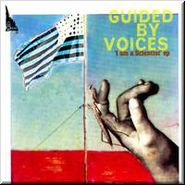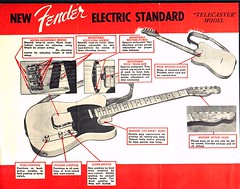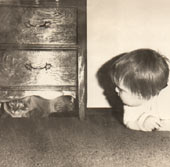
I hope the holidays find you well, my imaginary readers. To help make it happen, I have a few holiday-themed songs to share with you. At the same time, let me announce the newest iteration of my shambolic internet franchise. From this point forward, Damaged Goods For Sale will be a (sometimes) audioblog. That's right...on a less than regular basis, I will post an audio track or two to supplement the scattershot blog content you have come to not expect to see here.
So without further ado, I bring you the debut selection, themed for the holidays. Of course the holidays are half over, but you've yet to chide me for my lack of punctuality, haven't you, dear imaginary readers?
Radar Bros. - "This Xmas Eve"
Harry Nilsson - "Remember (Christmas)"
Crooked Fingers - "New Drink for the Old Drunk"
The first two tracks have little to do with Christmas, and the third has little do to with anything but drinking, so I've included it as my tribute to the new year festivities.
Buy their music: Radar Bros. / Harry Nilsson / Crooked Fingers
12.28.2006
Damaged Goods For Sale Becomes Eclectic
11.08.2006
11.07.2006
Believe the Hype...
 ...and go see Borat as soon as you possibly can. Every seat in the theater was filled when we went. I am not exaggerating when I say that this is one of the funniest movies I have ever seen. It got to the point where it hurt to laugh. I was in tears. A lady sitting behind me evidently didn't have any clue what she was in for, and sounded like she was experiencing an acute combination of ecstacy and pain. Every next moment she would be going "Ohhhh.....nooooo.....OOOOHHHHH!!!....oh no....." This would have been really annoying if I hadn't been laughing myself nearly to death the whole time. This carried on behind me until a certain part in the movie, and believe me, you'll know what part I mean if you've seen it, where I believe she was stunned into silence and uttered not a peep for the remainder of the film.
...and go see Borat as soon as you possibly can. Every seat in the theater was filled when we went. I am not exaggerating when I say that this is one of the funniest movies I have ever seen. It got to the point where it hurt to laugh. I was in tears. A lady sitting behind me evidently didn't have any clue what she was in for, and sounded like she was experiencing an acute combination of ecstacy and pain. Every next moment she would be going "Ohhhh.....nooooo.....OOOOHHHHH!!!....oh no....." This would have been really annoying if I hadn't been laughing myself nearly to death the whole time. This carried on behind me until a certain part in the movie, and believe me, you'll know what part I mean if you've seen it, where I believe she was stunned into silence and uttered not a peep for the remainder of the film.
11.06.2006
Back Da Bears...Grow A Moustache
 There reaches a point in every championship season where something special occurs, a transcendent moment where boundaries are crossed and legends are made. The Chicago Bears, if you ask nearly anyone in the land of Chicago, may very well be in the midst of such a season.
There reaches a point in every championship season where something special occurs, a transcendent moment where boundaries are crossed and legends are made. The Chicago Bears, if you ask nearly anyone in the land of Chicago, may very well be in the midst of such a season.
But have the Bears yet reached that threshold of transcendence? One might claim that it was crossed when Rex Grossman started the season with 262 yards against the Packers, firmly closing the door on a dismal preseason. One might claim that it came after that miracle comeback in the desert, a game which featured a number of transcendent moments, from Devin Hester's punt return for a touchdown, to twin fumble returns for touchdowns by Mike Brown and Charles "Peanut" Tillman, to the Cardinals' Neil Rackers, a Pro Bowl-caliber field goal kicker just a season previous, booting a floppy miss to seal a historically improbable comeback win. One might go so far as to claim that a threshold will be crossed in the Meadowlands on Sunday night if the Bears can manage to shake their miserable loss to the lowly Miami Dolphins and beat the suddenly red-hot New York Giants.
Oftentimes it is impossible to pinpoint that exact moment when a team goes from a contender to a champion until long after the dust has settled and the final score goes in the record books. But what is certain is that along the way to the realm of legend, champions must make sacrifices, just as the aforementioned Mike Brown has again sacrificed his body and suffered a season ending injury, and just as Jerry Azumah did, sacrificing so much that he was forced to retire before this potentially legendary season could even begin. What's more, true contenders must elevate their game to a level where only excellence is tolerated. The Chicago Bears, under the wise and watchful gaze of Lovie Smith, will be doing their part to bring the Lombardi trophy back to the house of Halas. In my opinion, it is time for the fans of the Chicago Bears to do their part as well.
To help cheer my beloved Bears along to what I hope will be a Super Bowl win in Miami this January, I have decided to grow a full Superfan-style moustache, and I will not shave it off until either the Bears win it all, or when they are eliminated for good, whichever comes first. I am not doing this out of any sense of irony, although like in most things I do, I am aiming for a few laughs along the way. I truly hope that by this small gesture, I can help supply some little amount of positive energy to raise the Bears' spirit, and hopefully there are more Superfans out there that will do the same.
This is where you come in. I have created three buttons that can be posted in any blog, Myspace, email signature, or whatever. Please, even if you can't or won't grow a moustache, copy whichever of these buttons you like best, paste it wherever you want it to be seen, and link it to this post so that other Superfans will understand and join the cause. If you can grow a moustache and will grow one, by all means let those strands grow. Just as Chicago was full of moustaches in 1985, let there also be a city of moustaches in 2006, and let's ride those moustaches all the way to the Super Bowl!
Disclaimer: The NFL, the Chicago Bears, Mike Ditka, William "Refrigerator" Perry, and Kyle Orton are in no way affiliated with this effort. Any pictures, likenesses, or mojo contained herein are utilized in the spirit of fair use and good clean fun, and anyhow any attention this effort might happen to engender will likely be forgotten as soon as it occurs, if it happens to occur at all.
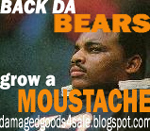

Posted by Bedheaded at 11/06/2006 11:11:00 PM 1 comments
Labels: Back Da Bears Grow A Moustache, Chicago Bears, Super Bowl
11.05.2006
Soundtrack for quitting
When I was leaving Suck-Ass Online University after my last day, I heard this song in my car. It was appropriate. The band is called Wolf Parade, and the song is "I'll Believe in Anything." The song's coda perfectly encapsulates my experience in that torture chamber of corporate education:
Nobody knows you, and nobody gives a damn anyway.
11.04.2006
Eyebrow revolt!
 My eyebrows are out of control! There are little thatches of eyebrow hair that get a lot longer than the rest, and they are going in all directions. For the most part these thatches grow at the arch points on the top of my eyebrows. These points are very defined on my face, and in the past I have been able to make a dramatic statement simply by raising one eyebrow. Part of me thinks it's cool, but then sometimes they will just be all wrong. Today, after I took a shower, I noticed certain portions of them were hanging like long hair. That wasn't too cool. I've started plucking these extra long ones when they start misbehaving, but they seem to come back pretty regularly. I'm a little paranoid that I will pluck too many of them and they won't grow back, and I don't want to lose that sharp arch in my eyebrows. I'm not sure whether I should be proactive with my eyebrows, or let them grow wild, like Andy Rooney has. It would be a lot cooler if I had white hair, and if my hair grew out in a sort of crazy white-guy afro like Einstein's, or Kramer's. But that's not gonna happen. Hair is such a bother. I wish I didn't have to deal with it.
My eyebrows are out of control! There are little thatches of eyebrow hair that get a lot longer than the rest, and they are going in all directions. For the most part these thatches grow at the arch points on the top of my eyebrows. These points are very defined on my face, and in the past I have been able to make a dramatic statement simply by raising one eyebrow. Part of me thinks it's cool, but then sometimes they will just be all wrong. Today, after I took a shower, I noticed certain portions of them were hanging like long hair. That wasn't too cool. I've started plucking these extra long ones when they start misbehaving, but they seem to come back pretty regularly. I'm a little paranoid that I will pluck too many of them and they won't grow back, and I don't want to lose that sharp arch in my eyebrows. I'm not sure whether I should be proactive with my eyebrows, or let them grow wild, like Andy Rooney has. It would be a lot cooler if I had white hair, and if my hair grew out in a sort of crazy white-guy afro like Einstein's, or Kramer's. But that's not gonna happen. Hair is such a bother. I wish I didn't have to deal with it.
11.03.2006
You Be My Imaginary Readers
Oh my oh my, I could not be more excited about Borat: Cultural Learnings of America for Make Benefit Glorious Nation of Kazakhstan. All the hype has been right up my alley. He doesn't have to even say anything funny, just seeing him makes me laugh. Even the commercial for the soundtrack is funny, especially the part when he plays portable synthesizer on "You Be My Wife":
And don't forget his press conference in front of the White House:
I'm so excited about seeing Borat: CLOAFMBGNK that I almost don't want to see it.
By the way, you can expect a lot more of these random, pointless blog posts as I have decided to take part in NaBloPoMo, which rolls off the tongue, doesn't it? The point is to write a blog post every day in the month of November. I'm inspired by my former comrade from Suck-Ass Online University, the Repressed Librarian. I am also two days late from starting, as is my wont.
Oh, I didn't tell you, my fair imaginary readers, that I no longer work at Suck-Ass Online University, did I? To be fair, I never overtly referred to it in any previous posts. The closest I came was this awfully turgid entry, which I wrote after I accepted the job. So many bad things happened there, I could have been making your hair curly on a daily basis. Somehow, I just couldn't bring myself to catalogue the daily horror of helping provide questionable education in a soul-sucking corporate hell-hole. RL did her part, so a lot of our travails are listed there. But were out of there now, which is all that matters.
Now I'm working at an actual academic library in an actual, honest-to-goodness university. In the spirit of anonymity, I will henceforth refer to my place of employment as New Deal University, in light its being the only university in the Land of Chicago named after a President (real hard to figure out which one I mean, right?) Like RL, I don't want to guarantee that all, or even a majority of my posts will be about my work at the New Deal University Library, but I will try and mention it every once in awhile, because goodness knows there aren't hardly enough library blogs out there in the world.
I am a scientist, I seek to understand me
| You Are An INTJ |
The Scientist You have a head for ideas - and you are good at improving systems. Logical and strategic, you prefer for everything in your life to be organized. You tend to be a bit skeptical. You're both critical of yourself and of others. Independent and stubborn, you tend to only befriend those who are a lot like you. You would make an excellent scientist, engineer, or programmer. |
9.12.2006
Obligatory 9/11 Post
Even though it's a day late, there are two 9/11-related things that I'd like to spotlight. First is this rather lengthy article from the New York Times about the sad, incompetent effort to redevelop ground zero. It is a super long article, but nowhere else will you read or see as authoritative and complete an account of the all-around clusterfuck that has resulted in ground zero still being a huge hole in the ground to this day, no buildings, no memorial, nothing but politics and bureaucracy at its finest. For the record, I have my own idea for redeveloping ground zero: fill it full of dirt, and plant grass and trees on top of it. It's not flashy, but it gets the job done. Plant a tree for every person that died there.
The Hole in the City's Heart
The second bit comes from Keith Olbermann, who I have a big ol' manly crush on after last night's episode of Countdown. I've only started watching him recently, being that I don't have any good cable channels, but I have been routinely entertained when I catch it. Last night he wrapped up with a withering indictment of our erstwhile "commander in chief," citing the Gettysburg Address and The Twilight Zone like only he can. The result is, let me say, awesome. Enjoy.
8.15.2006
Rock Taxonomy, pt. 1: Rhythm Guitar
You check out Guitar George he knows all the chords
Mind he's strictly rhythm he doesn't want to make it cry or sing
And an old guitar is all he can afford
When he gets up under the lights to play his thing
Dire Straits, "Sultans of Swing"
The guitar is the "prestige" instrument of rock. When seen strapped on any manner of rock performer, it stands as a symbol of credibility--nearly anybody feels like they can sing (witness the popularity of karaoke and its bastard offspring, American Idol), but if you can play guitar, you're a musician, you're cool.
In rock music, guitarists fall into two categories: lead guitarists and rhythm guitarists. Following the idea of guitar being rock's prestige instrument, guitarists who play lead enjoy higher levels of prestige. Just as the violin virtuoso receives more acclaim and flinged roses than does the second chair violin, the rhythm guitarist toils in the shadow of the lead guitarist. In the most typical of rock ensembles, one can expect to hear a solo on every one of the group's songs. One posits that the guitarist who can solo is the more skilled, more gifted guitarist; both the rhythm guitarist and the lead guitarist can play chords in sequence, after all, but if the rhythm guitarist could master scales and modes as effortlessly as the lead, then he or she wouldn't be a rhythm guitarist, would they?
Not necessarily. Rhythm guitar playing is no less virtuosic than playing lead. The very name of attached to this type of guitar playing--rhythm--disproves such reasoning: the difficulty of creating and sustaining rhythm should be easily appreciated by those who have little or none.
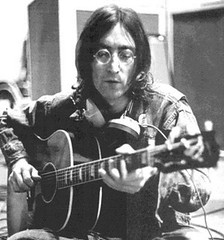 The Beatles did many things to change popular music. Though the invention of rock music is often ascribed to Bill Haley and the Comets (incorrectly or not; one could go as far back as Robert Johnson to find the starting point of rock), it goes without saying that the Beatles permanently defined the rules of rock music. After the Beatles, the prototypical rock ensemble would consist of the following makeup: lead guitarist, rhythm guitarist, bass guitarist, and drummer. Any of them could sing, and whoever sang lead was likely the guy who wrote the song. Therefore, as the Beatles are seen as the protypical rock band, John Lennon becomes the protypical rhythm guitarist, and sets many of the standards for rhythm guitar playing to this day. John Lennon never played a solo, but in some songs his rhythm took center stage, notably at the beginning of "I Feel Fine," which starts with popular music's first known instance of guitar feedback on a recording, and kicks off with John's driving rhythm, which nearly sounds like a hard-driving gospel organ. Lennon also establishes the rhythm guitarist as a vocalist. While none of the Beatles could be considered the group's "lead singer," Lennon sets the standard for the prototypical rhythm guitarist needing to, at the very least, serve as a harmonizing or backup singer.
The Beatles did many things to change popular music. Though the invention of rock music is often ascribed to Bill Haley and the Comets (incorrectly or not; one could go as far back as Robert Johnson to find the starting point of rock), it goes without saying that the Beatles permanently defined the rules of rock music. After the Beatles, the prototypical rock ensemble would consist of the following makeup: lead guitarist, rhythm guitarist, bass guitarist, and drummer. Any of them could sing, and whoever sang lead was likely the guy who wrote the song. Therefore, as the Beatles are seen as the protypical rock band, John Lennon becomes the protypical rhythm guitarist, and sets many of the standards for rhythm guitar playing to this day. John Lennon never played a solo, but in some songs his rhythm took center stage, notably at the beginning of "I Feel Fine," which starts with popular music's first known instance of guitar feedback on a recording, and kicks off with John's driving rhythm, which nearly sounds like a hard-driving gospel organ. Lennon also establishes the rhythm guitarist as a vocalist. While none of the Beatles could be considered the group's "lead singer," Lennon sets the standard for the prototypical rhythm guitarist needing to, at the very least, serve as a harmonizing or backup singer.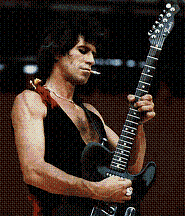 Just as the Beatles defined rock music, it could be said that the Rolling Stones refined the form. While John Lennon sets the initial standard for rhythm guitar playing, it must be said that Keith Richards set the standard by which all future rhythm guitarists would be judged. The reason for this could first be ascribed to the Stones' setting the standard for rock music itself by taking rock away from the polished sounds of white popular music and rooting it in the hard-edged rhythms of electric blues, which again points to blues legends such as Robert Johnson, Leadbelly, John Lee Hooker, and Bo Diddley as the true originators of rock music, and indeed, the unsung legends of rhythm guitar. As the inheritor of that legacy, Keith Richards should rightly be regarded as the greatest rhythm guitarist in the history of rock music. The proof is not only in his rhythmic prowess, but in the importance he forever bestowed on the cornerstone of rhythm guitar playing--the riff, or as the opening bars of "(I Can't Get No) Satisfaction" are forever known, "The Riff." What's more, as the "coolest" member of one of the coolest bands in rock history, Keith Richards established standards of personal style for rhythm guitarists that still endure--silently stalking his side of the stage, idly puffing on a cigarette, piping in harmonizing vocals whenever they're needed, taking lead vocal duty once in a great while.
Just as the Beatles defined rock music, it could be said that the Rolling Stones refined the form. While John Lennon sets the initial standard for rhythm guitar playing, it must be said that Keith Richards set the standard by which all future rhythm guitarists would be judged. The reason for this could first be ascribed to the Stones' setting the standard for rock music itself by taking rock away from the polished sounds of white popular music and rooting it in the hard-edged rhythms of electric blues, which again points to blues legends such as Robert Johnson, Leadbelly, John Lee Hooker, and Bo Diddley as the true originators of rock music, and indeed, the unsung legends of rhythm guitar. As the inheritor of that legacy, Keith Richards should rightly be regarded as the greatest rhythm guitarist in the history of rock music. The proof is not only in his rhythmic prowess, but in the importance he forever bestowed on the cornerstone of rhythm guitar playing--the riff, or as the opening bars of "(I Can't Get No) Satisfaction" are forever known, "The Riff." What's more, as the "coolest" member of one of the coolest bands in rock history, Keith Richards established standards of personal style for rhythm guitarists that still endure--silently stalking his side of the stage, idly puffing on a cigarette, piping in harmonizing vocals whenever they're needed, taking lead vocal duty once in a great while.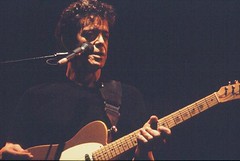 It seems downright essential that the rhythm guitarist of any band be able to contribute vocals in some fashion, be it as co-lead in a group of singers a la Lennon for the Beatles, backup vocalist and occasional lead a la Richards for the Stones, or as most often seen, lead singer of a group, such as Lou Reed, fronting the Velvet Underground or solo. With Reed, we must note the amount of seriousness he puts into his guitar playing, not letting his duty to the rhythm fall victim to his prowess as a vocalist. As with many things Lou Reed does, his insistence on contributing as a guitarist could be seen as pomposity, but in the context of rhythm guitar playing, it is essential. A lead singer can be a rhythm guitarist, but it is necessary for he or she to do more than contribute the occasional chord progression--rhythm guitar must in some way contribute to the song as a whole, and above all, must carry or contribute to the rhythm of a rock song.
It seems downright essential that the rhythm guitarist of any band be able to contribute vocals in some fashion, be it as co-lead in a group of singers a la Lennon for the Beatles, backup vocalist and occasional lead a la Richards for the Stones, or as most often seen, lead singer of a group, such as Lou Reed, fronting the Velvet Underground or solo. With Reed, we must note the amount of seriousness he puts into his guitar playing, not letting his duty to the rhythm fall victim to his prowess as a vocalist. As with many things Lou Reed does, his insistence on contributing as a guitarist could be seen as pomposity, but in the context of rhythm guitar playing, it is essential. A lead singer can be a rhythm guitarist, but it is necessary for he or she to do more than contribute the occasional chord progression--rhythm guitar must in some way contribute to the song as a whole, and above all, must carry or contribute to the rhythm of a rock song.Other noteworthy rhythm guitarists, in no particular order:
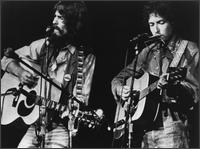
- Bob Dylan
- Black Francis, The Pixies
- Izzy Stradlin, Guns 'n Roses
- Malcolm Young, AC/DC
- Al Jardine, The Beach Boys
- David Bowie
- Ian Hunter, Mott the Hoople
- Wayne Coyne, The Flaming Lips
- Thurston Moore, Sonic Youth
- Tom Verlaine, Television
- Matthew Sweet
- Peter Buck, R.E.M.
- Robyn Hitchcock, The Soft Boys
- David Byrne, The Talking Heads
- Nash Kato, Urge Overkill
- Tobin Sprout, Guided By Voices
- Ric Ocasek, The Cars
- Chrissie Hynde, The Pretenders
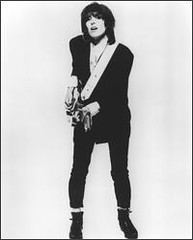
The Rock Taxonomy will continue with pt. 2: The Bass Player.
8.14.2006
Announcing my spiffy new look, along w/ other useless info
The main reason I'm writing this is to announce the debut the pretty new look of my blog. (This information is especially useless if you happen to be reading this at my MySpace Branch, where nothing has changed; if you want to see what I'm talking about, go visit the Blogger Branch.) The main reason I decided to change the template is that I screwed up my old one. I was tinkering around with the junk on the sidebar, and went a little too far. Since I don't really know how to work CSS, I just kept dithering around with tags until it looked the way I wanted it, but this time I only served to make it look totally stupid. So, I found a new one, which thankfully was coded much simpler than the old one was, and tailored it to my liking. I hope you find it pleasing, my imaginary readers. If not, well, there's always the MySpace Branch.
I hate to think of you getting upset, to drop by only to encounter such an insignificant announcement. So to whet your appetite, I've decided to give you more insigificant information. This is a meme that anyone who's anyone has already done. I filched it from Sandra's blog Not That Desperate, which is a nifty blog, if you ask me.
Bold = books I've read.
Red = I have no intention of ever reading ever in my lifetime.
Green = I've never even heard of.
Blue = I have on my list and intend to read.
Orange = I might read some day.
1. The Da Vinci Code - Dan Brown (Too bad intense, molten red isn't an option, to convey my intense distaste for this man and this book. I might read the book he stole his entire plot from, however: Holy Blood, Holy Grail)
2. The Catcher in the Rye - J.D. Salinger (Somehow I've managed to miss this one, even though I did in fact live through an adolescence in the United States of America)
3. The Hitchhiker's Guide To The Galaxy - Douglas Adams
4. The Great Gatsby - F.Scott Fitzgerald
5. To Kill a Mockingbird - Harper Lee.
6. The Time Traveler's Wife - Audrey Niffenegger
7. His Dark Materials - Philip Pullman (Looks like it's right up my alley!)
8. Harry Potter and the Half-Blood Prince - J. K. Rowling (I don't have anything against these books; I like the movies, and I have read a book after seeing its adaptation a number of times, but it seems these movies hew too closely to the books, making it rather uninteresting to read after seeing the movie)
9. Life of Pi - Yann Martel
10. Animal Farm: A Fairy Story - George Orwell
11. Catch-22 - Joseph Heller
12. The Hobbit - J. R. R. Tolkien
13. The Curious Incident of the Dog in the Nighttime - Mark Haddon
14. Lord of the Flies - William Golding
15. Pride and Prejudice - Jane Austen
16. 1984 - George Orwell
17. Harry Potter and the Prisoner of Azkaban - J. K. Rowling (I thought the movie was fantastic - the best so far; see #8)
18. One Hundred Years of Solitude - Gabriel Garcia Marquez (Oh, how I loved this book. It messed with my mind.)
19. Memoirs of a Geisha - Arthur Golden
20. The Kite Runner - Khaled Hosseini
21. The Lovely Bones - Alice Sebold
22. Slaughterhouse 5 - Kurt Vonnegut
23. Angels and Demons - Dan Brown (This would be "never heard of", but seeing the author's name is all I need to know)
24. Fight Club - Chuck Palahniuk (I'm afraid of this guy; like, I'm afraid he's going to assault my mind)
25. Neuromancer - William Gibson
26. Cryptonomicon - Neal Stephenson
27. The Secret History - Donna Tartt
28. A Clockwork Orange - Anthony Burgess
29. Wuthering Heights - Emily Bronte
30. Brave New World - Aldous Huxley
31. The Lion, the Witch and the Wardrobe - C. S. Lewis
32. Middlesex - Jeffrey Eugenides
33. Cloud Atlas - David Mitchell
34. The Lord of the Rings - J. R. R. Tolkien
35. Jane Eyre - Charlotte Bronte
36. Good Omens - Terry Pratchett, Neil Gaiman
37. Atonement - Ian McEwan
38. The Shadow Of The Wind - Carlos Ruiz Zafon
39. The Old Man and the Sea - Ernest Hemingway (sort of the same way I managed to live an entire adolescence without reading Catcher in the Rye, I managed to get a Bachelor's degree in English while only reading one book by Hemingway, In Our Time. Dunno, it just happened that way.)
40. The Handmaid's Tale - Margaret Atwood
41. The Bell Jar - Sylvia Plath
42. Dune - Frank Herbert (I just don't see myself making the commitment necessary to read this at any point in the near future, considering all the books I already own and haven't managed to read yet. It's sad, really.)
8.10.2006
My Life on Records: A different kind of Moon Safari
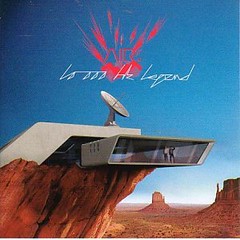 Air - 10,000 Hz Legend
Air - 10,000 Hz Legend
Astralwerks (2001)
When Air first arrived on the pop music scene, their sound was described earnestly by some as elevator music, and fit nicely in the niche of groups making so-called "space-age bachelor pad" music. That term was made most famous by Juan Garcia Esquivel, master of high-fidelity easy listening epics, who enjoyed a resurgence of interest in his work in the mid-nineties thanks to a Matt Groening-approved compilation and an appearance on the soundtrack to Four Rooms, which featured music from Esquivel acolytes Combustible Edison. Stereolab revived the phrase for their album The Groop Played "Space Age Bachelor Pad Music", Capitol Records cleaned their vaults with their staggering 18-volume Ultra Lounge series, and even the Beastie Boys got in on the act with their one-off fans-only disc The In Sound From Way Out.
Air's debut album Moon Safari coasted in smoothly on the ebb tide space-age bachelor pad music's popular revival. It floated on a plush cloud of vintage Moog synthesizers and Fender Rhodes, occasionally trimmed with french horn flourishes cribbed straight out of Burt Bacharach's wet dreams. The French duo that made up Air, Nicolas Godin and Jean-Benoît Dunckel added a touch of icy Euro-cool to their tunes with their gently cooing Gallic voices, often run through a vocoder. The lush, atmospheric sounds and moody instrumentals of Moon Safari sounded perfect for a film soundtrack, and appropriately, Air's next effort was the soundtrack to Sofia Coppola's debut film The Virgin Suicides. The EP Premier Symptomes collected their early singles, showing how they first learned the formula for rocking a french horn and a Moog in the same song, making slow-burn bliss-outs like "Le Soleil est Pres de Moi" sound like an anthem of mellow joy.
Godin and Dunckel strayed sharply from the space-age course with their third full-length album, 10,000 Hz Legend. The cover of the record seemed to depict the two gazing from a literal space-age bachelor pad perched high above Monument Valley, but the songs within could hardly be described as easy listening. The opening track sets the tone: "Electronic Performers" features a voice vocoded so heavily that it sounds less like the mellow tune-bots of Moon Safari and more like a robot grown a little weary from tinkling the mellow ivories:
We need to use envelope filtersThe next track, "How Does it Make You Feel," would not sound out of place on Moon Safari, what with its softly intoned Fender Rhodes chords, sweetly soaring chorus, and intimately romantic lyrics, that is, if those romantics lyrics did not sound as though they were sung by a robot with the voice of a frog:
To say how we feel
Riding on magnetic waves
We search new programs for your pleasure
I want to patch my soul on your brain
BPM controls yoour heartbeats
We are the syncronizers
We are electronic performers
I am feeling very warm right nowAt the end of the track, a female robot voice provides the punchline and the answer: "Well, I really think you should quit smoking."
Please don't disappear
I am spacing out with you
You are the most beautiful entity that I've ever dreamed of
At night I will protect you in your dreams
I will be your angel
You worry so much about not having enough time together
It makes no difference to me
I would be happy with just one minute in your arms
Let's have an extended play together
You're telling me that we live to far to love each other
But your love can stretch further than you and I can see
So, how does it make you feel?
"Radio #1" is the next track and the only single from this record, sounding like a slightly-off ELO with the chorus "If you need some fun / Some good stereo gum / Radio #1 / Brand new ears at once / Eject musical trash / Radio #1." On the next track, none other than Beck Hansen drops by the bachelor pad, sounding elegantly wasted and moved by the signature moods evoked by Air:
Golden waves
In all directions
I could lose my soul right here
Colour lights
On the runway
Makes a stranger feel unchained
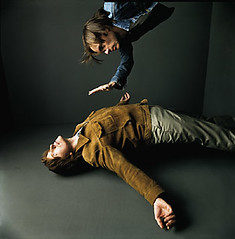 "Radian," one of the two intrumentals on this record, is the only track on 10,000 Hz Legend that evokes the polish of Moon Safari. It does the space-age Moog music thing so well that it effectively answers those who wondered why this record couldn't be more like its predecessors. If Moon Safari and Virgin Suicides established Air as expert purveyors of instrumental space-age pop, then "Radian" was their capstone and ultimate acheivement in the form. It perfectly evokes a mood of quiet seduction, growing rapture, and the reflection and release that comes afterward.
"Radian," one of the two intrumentals on this record, is the only track on 10,000 Hz Legend that evokes the polish of Moon Safari. It does the space-age Moog music thing so well that it effectively answers those who wondered why this record couldn't be more like its predecessors. If Moon Safari and Virgin Suicides established Air as expert purveyors of instrumental space-age pop, then "Radian" was their capstone and ultimate acheivement in the form. It perfectly evokes a mood of quiet seduction, growing rapture, and the reflection and release that comes afterward.The next three tracks serve to dispel the almost coital bliss evoked by "Radian," and return the record to its dominant themes: weariness, disillusion, and clausterphobia, all antithetical to the groovy vibe so often ascribed to space-age bachelor pad music. "Lucky and Unhappy" has our boys reeling from the antiseptic removal of feelings that is the byproduct of fame. "Sex Born Poison" seems to describe the perils of sex between consenting robots:
Meet my desire sensorsIn "People in the City," Air takes a second to step back and look at their surroundings, and they find themselves in a claustrophobic metropolis straight out of Blade Runner:
My atom juice of joy
You want to use my affective circuits
Run to the fire exit
Use your cooling system
You'll never reach the 7th sky today
P.E.O.P.L.E.C.I.T.YAfter all that paranoia and malaise, Godin and Dunckel once again gleefully subvert the smooth Euro-cool image they gained from their earlier recordings on "Wonder Milky Bitch", flaunting the same oddball humorous streak that "How Does it Make You Feel" revealed earlier, and replacing that song's romance with naughty innuendo:
People in the city
P.E.O.P.L.E.C.I.T.Y
People in the city
Moving, watching, working, sleeping, driving, walking, talking, smiling
Moving, watching, working, sleeping, driving, walking, talking, smiling
On the sidewalk (People in the city)
Near the street lamp (People in the city)
At the bus stop (People in the city)
Down the station (People in the city)
This is the story of a country girlPairing a lurid jews harp with a dreamily strummed acoustic guitar, "Wonder Milky Bitch" provides an answer for anyone who ever wondered what it would sound like if Lee Hazlewood ever sang lead vocals for T.Rex.
Back in town from her country house
She came to me with her muddy boots
She destroyed all my carpet
You know how to do it
Wonder milky bitch
You never wear cosmetic
You don't like arithmetic
You know how to do it
Wonder milky bitch
Tasting, touching, swallowing me
Drinking me like bloody mary
10,000 Hz Legend goes out with a one-two punch. "Don't Be Light" could be interpreted as a statement of the album's ultimate objective, both by its title and its execution. It sounds as though Air is speeding away from the high-tech nightmare they had surrounded themselves with, alternating a rapid techno-derived synthesiser blips with raucous, overdriven guitar solos. They pause halfway through to observe the second cameo of Beck's Vagabond, returning from mellow cosmic voyage he set off for with Air's earlier help, now intoning an eerie epitaph:
Don't be light, don't be light, a-ha"Carmel Prisoner" serves as the second instrumental and final salvo on the strange, synthetic voyage undertaken by our French duo. We don't know if they made it out, but the title and the relentless technological throb of the song makes us think they have ended up lost in some endlessly repeating pleasure circuit.
Wild life
The grey surprises of our days
Singing in caves
Fabricating a new abandon
We don't see the master's hand
We bang on gold tamourines
In the cross hairs of some transient gun
Trading desires on the banquet line
La, la, la, la, la, laaaa....
10,000 Hz Legend was greeted with confusion by critics and fans who were once wooed by the smooth electronics of Moon Safari. Rolling Stone called it a "deranged dim sum of sound: Some of it is tasty, most of it is weird and, ultimately, you will never know what your ears are eating." Describing "Radian," it complained, "There's a palpable sense of wistfulness to the track, a moody blues that repeatedly surfaces on 10,000 Hz. Legend then disappears again. But this vague angst is the only thread that runs through every song, and when Beck drops by and ruins "The Vagabond" with the same minstrel-show Prince impersonation he sported on Midnite Vultures, one begins to wonder if this isn't a compilation of electronic performers instead of an album by one band....It's nice that 10,000 Hz. Legend sounds very little like Air's masterworks Premier Symptomes and Moon Safari. Unfortunately, it also sounds like Air trying very hard not to be Air." England's NME, giving the record a 9 out of 10 but seemingly praising it with faint damnation, said "There's nothing like gratuitously trashing your public image. If Air's debut album...established them as a byword for casual style-mag chic, then its successor looks like a brazen attempt to destroy that image for good. 10,000 Hz Legend is nothing like Moon Safari, then again it doesn't really bear a resemblance to much. Instead, it's a glowing, highly ambitious, quasi-concept album that sees Air spiralling off on a wildly idiosyncratic and brilliantly insane tangent all of their own."
While being a huge fan of Moon Safari and Premier Symptomes, as well as their most recent album, the less difficult and more Moon Safari-like Talkie Walkie, I still consider 10,000 Hz Legend to be Air's best album. My reasoning revolves around the concept of evolution, at least as much as one can apply evolution to pop musicians. Popular music is riddled with excellent debut albums. When an album is delightful and effective, it leaves listeners wanting more. What makes a band really great, in my estimation, is when a group takes the expectation and promise that comes after the release of their first records, and does something unexpected: evolves, adapts, and gets better.
Witness the evolution of many great pop musicians from one touchstone album to another: The Beatles from Please Please Me to the White Album; The Beach Boys from Surfin' USA to Pet Sounds; Lou Reed from Transformer to Berlin; David Bowie from Hunky Dory to Low; Ween from God Ween Satan: The Oneness to Chocolate and Cheese; Beck from Mellow Gold to Odelay and Sea Change.Similarly, 10,000 Hz Legend sees Air making a move in the direction of evolution, re-evaluating the sounds, moods, and themes of their earlier work, and in the process making a record that's smarter, more literate, edgier, and ultimately more exciting than the ones they made before.
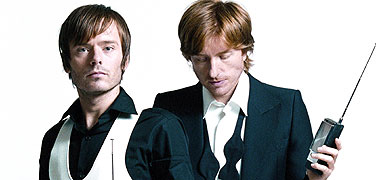 This is the kind of evolutionary process I want to experience happening to all the bands I enjoy. I want them to go from a great band to one that is truly outstanding. In my opinion, the great bands do this by taking what they do well, turning it around, and doing something totally unexpected with it. It is rare when this process works. On 10,000 Hz Legend, it works better than anyone who ever blissed out to the mellow sounds of Moon Safari could have expected.
This is the kind of evolutionary process I want to experience happening to all the bands I enjoy. I want them to go from a great band to one that is truly outstanding. In my opinion, the great bands do this by taking what they do well, turning it around, and doing something totally unexpected with it. It is rare when this process works. On 10,000 Hz Legend, it works better than anyone who ever blissed out to the mellow sounds of Moon Safari could have expected.
8.07.2006
Something 'bout books
I have been tagged by the Repressed Librarian, my comrade in the propagation of book learnin' and author of the frequently moving blog To Know as We Are Known, to take part in a book meme. Because she is my comrade, and because I've never been tagged for this kind of bloggy thing before, I will comply.
:::::
1. One book that changed your life?
I think the book that had the biggest effect on my personality was The Hitchhiker's Guide to the Galaxy. It was a major influence on my sense of humor and my conception of life, the universe, and everything.
As far as serious changes go, reading A Tree Grows in Brooklyn in high school launched my love for literature.
2. One book you have read more than once?
I rarely read a book more than once. The only ones I can think of that I have read more than once are The Hobbit and Stephen King's The Stand.
3. One book you would want on a desert island?
If I were on a desert island, I wouldn't want anything, because I can never decide what I would want on a desert island. I can never pick one thing as my favorite of anything. I prefer top-fives. If pressed, I guess I would pick Shelby Foote's three-volume Civil War series. Why? One, because I've never read it, two, because it would take a while to read, and three, because I really want to read it, and look at it often in bookstores, but chicken out all the time. Another choice along those lines would be The Decline and Fall of Roman Civilization. One book that follows the above criteria which I have read is Infinite Jest, by David Foster Wallace.
4. One book that made you laugh?
Recently, it was Pastoralia, by George Saunders.
5. One book that made you cry?
I don't think that a book has ever made me cry. I have cried at a few movies, but never because of a book.
6. One book you wish had been written?
Any book that has my name on the spine as the author.
7. One book you wish had never been written?
Dianetics, or anything by L. Ron Hubbard, for that matter.
8. One book you are currently reading?
Since I've started working, I have not read a single book this year. It's sad, because I am used to reading all the time, and usually go from book to book. Part of it is because of my schedule, but part of it is because I haven't found a book that was interesting enough for me to keep wanting to read it.
This crisis finally ended when I started reading The Fortress of Solitude by Jonathan Lethem. It's the kind of book that I don't want to put down and can't wait to pick up again.
9. One book you have been meaning to read?
I have a huge pile of books I have managed to avoid reading for a long time now, but I think I'm going to read Jonathan Strange and Mr. Norrell next.
10. Now tag five people.
I'm not nearly as connected as my comrade RL, so if you are out there, and you just happen to read this blog, go ahead and consider yourself tagged.
8.03.2006
The Records of My Lifetime
This is the first of what I hope will be a weekly feature. I'm planning, optimistically, to profile a different record approximately every Thursday. I think that the title of the feature, "The Records of My Lifetime," is totally pompous, reminding me of some kind of Sinatra-wannabe doing a Vegas revue, but it's all I can think of at the moment, and is likely to change if I think up something more clever. So without further ado, I bring you....
:::::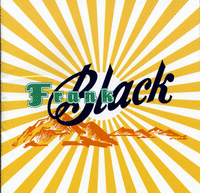 Frank Black - Frank Black
Frank Black - Frank Black
4AD/Elektra (1993)
There are arguably more fans of the Pixies now than there were when they broke up in 1993. You can break that band's fanbase into two camps by asking a Pixies fan to name the man who served as lead singer, rhythm guitarist, head songwriter, and primary oddball for that highly influential group. The first camp, likely made up of those who were a fan of the Pixies before they broke up, will answer "Black Francis." The second camp, likely made up of those who became fans of the Pixies after they broke up, will answer "Frank Black." To be nauseatingly honest, the man's real name is Charles Thompson, but it's likely only his mother and his wife call him that. I am one of the second camp; whenever I refer to the Pixies, I automatically refer to the man who led them as Frank Black. The reason for this is, following my earlier stated reasoning, I had not heard a single song by the Pixies until a few years after they broke up. My first contact with the off-kilter pop songcraft of one Mr. Charles Thompson came by way of his first solo album, where he reversed his stage name and was known forever after as Frank Black. To reinforce the name change, the album's spine, in a subtle stroke of humor, diligently lists both the artist's name and the album's title in order: Frank Black - Frank Black.
"Ironic" is one of those overused words often thrown at Frank Black and his earlier band, and often used to describe the music that came out of the oft-mislabeled genre his work was herded into: indie rock, college rock, and the hoariest misnomer of all--alternative rock. How else to describe an album whose songs include an appreciation of a distinctive style of facial hair, a travelogue from a UFO convention, an instrumental version of a song that to anyone's knowledge does not have lyrics, and one song that crests on repeated shouts of the word "Jerk"? These songs would be ironic, were there any guile invovled, and if their subject matter were meant to stand in for something other than what they are ostensibly "about". In my mind, Frank Black's modus operandi is less about irony and more to do with his own unique sense of humor, along with an appreciation of the transcendant joy that comes from coupling a good pop hook with a wry turn of phrase.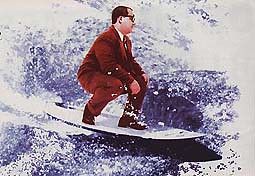 The album starts with "Los Angeles," but not the one in South California, he warns, "they got one in South Patagonia." This song shifts from a dreamy, acoustic guitar and xylophone-accompanied rememberance of a man, "...he was a good man/Sailing and shoring/He got a betatron, man," and then kicks into a superheavy metal-esque riff, where he again clarifies which Los Angeles he wants to live in, then back to the strummy part about the man, "dancing the beta can-can." It's a highly dramatic tonal shift, and it give the album a rousing start. Next comes "I Heard Ramona Sing," in which "Ramona" is the Ramones, and the song is an appreciation of one of Frank Black's favorite bands.
The album starts with "Los Angeles," but not the one in South California, he warns, "they got one in South Patagonia." This song shifts from a dreamy, acoustic guitar and xylophone-accompanied rememberance of a man, "...he was a good man/Sailing and shoring/He got a betatron, man," and then kicks into a superheavy metal-esque riff, where he again clarifies which Los Angeles he wants to live in, then back to the strummy part about the man, "dancing the beta can-can." It's a highly dramatic tonal shift, and it give the album a rousing start. Next comes "I Heard Ramona Sing," in which "Ramona" is the Ramones, and the song is an appreciation of one of Frank Black's favorite bands.
I had so many problems
And then I got me a walkman
I really liked it a lot and
They walked right in and they solved them
They walked right in and they solved them
I heard Ramona sing
And I heard everything
The speed they're traveling
They are the only thing
Ramona
One of the most memorable tracks is "Fu Manchu," which manages to be both about the mythical crime lord as well as his moustache.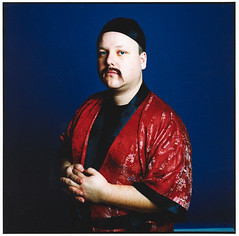 You heard about
You heard about
A criminal man of virtue
Is there any doubt
His minimal strands would suit you?
Is a hard earned way
Is a hard earned way
I'll never lose
My fu manchu
My fu manchu
Let them grow out
In time you'll feel so better
The vanishing pout
Now you're a real go-getter
Sound-wise, this song represents the production of the album well. Frank Black's vocals sound dreamy, almost effortless, and his acoustic guitar nicely mixes with the bouncy, surf-inspired bass line. Lurid counterpoint is provided by the synthetic, plastic-sounding horn section, which appear throughout the record and help give it a signature tone. Frank Black sounds slick and synthetic, less noisy and organic than the Pixies albums were. This serves to distinguish the record from his more celebrated work, for one, and second, it serves these songs well: the sound doesn't get in the way of the lyrics or the hooks, and while it draws obvious inspiration from a number of things--surf music, punk rock, the Beach Boys--it doesn't sound like any of them. This album effortlessly created a signature sound that groups like Weezer could never improve upon. In a way, the Pixies created "alternative rock" as it came to be known, and on Frank Black, the creator perfected his creation, making it sound as though it always existed.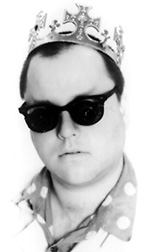 Frank Black's next record, Teenager of the Year, is considered by some people to be the best work he had ever done, and I remember once that a book was published with its sole subject being that Teenager of the Year was best album ever recorded. I think its massive length makes it less effective than the more consise Frank Black, but the opening four tracks, "Whatever Happened To Pong?", "Thalassocracy", "(I Want To Live On An) Abstract Plain", and "Calistan", come on so fast and so furious that at the very least it qualifies as one of the best album sides ever put to wax. Additionally, "Headache" is a fantastic pop song that in a weirder world, one that was listening to better pop music than Ace of Base, Aerosmith, and Green Day, would have been a massive hit.
Frank Black's next record, Teenager of the Year, is considered by some people to be the best work he had ever done, and I remember once that a book was published with its sole subject being that Teenager of the Year was best album ever recorded. I think its massive length makes it less effective than the more consise Frank Black, but the opening four tracks, "Whatever Happened To Pong?", "Thalassocracy", "(I Want To Live On An) Abstract Plain", and "Calistan", come on so fast and so furious that at the very least it qualifies as one of the best album sides ever put to wax. Additionally, "Headache" is a fantastic pop song that in a weirder world, one that was listening to better pop music than Ace of Base, Aerosmith, and Green Day, would have been a massive hit.
Needless to say, Frank Black led me to seek out the Pixies, and without question Doolittle and Surfer Rosa are albums that merit equal or greater contemplation than this one. But Frank Black is where I started, my first introduction to the weird world this man created under both of his altar egos, and more importantly, one of the records that helped show me that there was more to music than the Beatles, more than the hairy garbage being beat to death on classic rock radio, and more than the soulless "product" that continues to make people think of empty fluff when they hear someone refer to "pop music". Without Frank Black, there might not have been a Nirvana, a Pavement, a Ween, or even a Breeders, for me or for anyone else. Like the man said, "they walked right in and they solved them."
8.02.2006
This wheel's on fire
Perhaps I have not been as forthcoming as you deserve me to be, my beloved imaginary readers. If you were to count up the sum of my interests from what I've posted here, and created some sort of doppelbedheaded, you might imagine me to be a peacenik, comic book nerd, classic-rock AM Gold head, liberal, francophile, wannabe writer guy. Well, most of it is true, but it doesn't give you the real me. The real me is much more banal and much less intelligent than this already banal and unintelligent blog would lead you to believe.
I've struggled with how much of the "real" Bedheaded I feel comfortable posting on this already insignificant outpost of the intergalactic garbage dump we call the internets. The problem with being a confessional blogger is that one must necessarily have some halfway significant confession to make in the first place. Well, my life's pretty boring, so there's not much. But there are a few things.
First of all, though my recent rash of peacenik pronouncements might make one think otherwise, I at heart am a solitary, distrustful person, and harbor an overwhelming distaste for human nature that compounds itself daily, even hourly. It seems to be all I can do to keep from devolving into a raving lunatic, spitting out bile at any soul unfortunate enough to cross my path.
It seems the more contact I have with people out of my immediate circle of family and friends, the more I become convinced that the world is populated by insane idiots. That's not to say that I think I'm more intelligent than anyone else, but more that a great majority of people are either really stupid, really crazy, or both really stupid and really crazy. And the more I encounter these people and these situations, the more I feel the urge to rally around those small things I have that remind me of what makes sense in the world: my family, my friends, my interests, and my beliefs, self-isolating as those beliefs may be.
Belief is a loaded word, too closely associated with religion, which leads to the next revelation: I am an atheist. I don't believe in gods, or in afterlifes, and I'm not really interested in debating anybody about it. It's my business, that's all. I chalk it up at its base to not being a spiritual person in general. I have my own sense of spirit, and my own soul, but at the most essential level, I find myself to be neither spiritual nor soulful.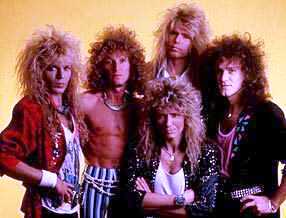 See, this is why I usually avoid this kind of confessional stuff--it does nothing to enlighten us, and likely causes you, my imaginary readers, to envision me as some really morose kind of dude. I'm not, really. In fact, I think the whole world could stand to be a little less morose. Thom Jurek at allmusic.com wrote a pretty good essay lamenting the dourness of rock music in the past decade or so, though I must say that any cultural commentary that concludes by suggesting that people should mellow out and go listen to some Whitesnake is kind of suspect. But who am I to judge.
See, this is why I usually avoid this kind of confessional stuff--it does nothing to enlighten us, and likely causes you, my imaginary readers, to envision me as some really morose kind of dude. I'm not, really. In fact, I think the whole world could stand to be a little less morose. Thom Jurek at allmusic.com wrote a pretty good essay lamenting the dourness of rock music in the past decade or so, though I must say that any cultural commentary that concludes by suggesting that people should mellow out and go listen to some Whitesnake is kind of suspect. But who am I to judge.
7.24.2006
Yes is surrender, you got to let it, you got to let it go
 Witnessing the current violence between Israel and Lebanon, along with the escalation of hostility between the U.S., North Korea, and Iran, and the ongoing war in Iraq, proves to me now more than ever that in order to survive beyond this century, to say little of this very decade, this world must take a stand in defiance of war, and fully embrace the cause of peace. The stakes of war have become higher than ever, with the fate of all mankind inching ever closer to the balance of all conflicts. As the world becomes increasingly globalized, interconnected, and interdependant, what was once global becomes ever more local, and all violence becomes local as well.
Witnessing the current violence between Israel and Lebanon, along with the escalation of hostility between the U.S., North Korea, and Iran, and the ongoing war in Iraq, proves to me now more than ever that in order to survive beyond this century, to say little of this very decade, this world must take a stand in defiance of war, and fully embrace the cause of peace. The stakes of war have become higher than ever, with the fate of all mankind inching ever closer to the balance of all conflicts. As the world becomes increasingly globalized, interconnected, and interdependant, what was once global becomes ever more local, and all violence becomes local as well.
If the twentieth century was notable for its wars, it was also notable for the moral certainty underpinning its most notorious conflicts. Yet, following the irresolution of the Korean War, and continuing through Vietnam, Israel, and now Iraq, war has lost all pretense of glory, losing the certainty of victory among the growing pallor of ambiguity. Perhaps the true turning point was the destruction of Hiroshima and Nagasaki under America's newfound atomic might. Never had warfare been more technological, more industrial, more effectively inhuman, and never again would human history rise and fall with the tides of war. In the atomic age, the new certainty was that after war there would only be a fall.
Our current war in Iraq was sold on the bonds of moral certainty, and shamefully, I bought more than my share. I was less concerned by Bush II's chicken-little cries of anthrax and dirty bombs, and more convinced that Iraq would be better off without Saddam running it. Though I had no reasonable evidence to support such an expectation, I expected our incursion into Iraq would be swiftly followed by efforts to support Iraq's infrastructure, and that a new government would soon be nurtured into place. The latter expectation was based on a misunderstanding of the bitter gulf between Sunni and Shiite muslims; the former expectation must have been fostered by some kind of temporary insanity that led me to forget the ribald ineptitude that had been the early days of the W administration. Iraq was stupidly allowed to devolve into a prehistoric state; utilities were shut off, libraries museums and archives were ransacked, and basic safety and security was obliterated by what has become the hallmark of post-atomic warfare--guerilla insurgency.
I was wrong about Iraq. So was John Kerry, apparently, though he failed in articulating his change in stance, which was but one, and a minor one, of his many failings. The truth of the matter was that I was fooled, and the lesson I learned was to never be fooled again. War is a refuge of desperation and weakness, and as it wears along it serves to further deteriorate the bonds of mankind, a gradual erosion that soon will lead to complete and utter decay and destruction.
Those who are lost in the fog of war will tell you that peace is an illusion, a pipe dream. To an extent, they are right, but it is only because of the fog of ambiguity that fosters all of our warfare. One will say, "how can you just sit back if your soldiers are kidnapped and beheaded?" or, "how can you just wait until the next World Trade Centers have planes flown into them?" or, "how can you just stand pat when our trains are bombed?" Such arguments try to paint the cause of peace as an exercise in ignoring reality, where ironically, the cause of war is without a doubt aided by judicious forgetfullness of reality. Then we ask, "if you consider that we are addicted to oil, and then consider that we arm the world, which pits those who stoke our oil addiction against those we arm, and in the process we anger an increasingly dangerous sector who despise us for simply being in their general vicinity, how do we deign to justify war on any grounds of moral certainty?" Or something to that effect.
War is never as simple as "smite me, I smite you back." The initial smiting is the result of eons of festering hatred, and the retaliatory smite strikes more than the intended target, injures more than the initiating party, and fosters ensuing eons of hatred. The cycle of war continues to turn, but recent misadventures in nuclear brinksmanship have me convinced that our current cycle of war may end them all, with the whole world the loser.
The answer to the equation is peace, complete and unequivocal peace. Though our current head of state seems utterly uncapable of it (his latest misfire has him sexually harrasing the prime minister of Germany), diplomacy and statesmanship should be seen as the primary tool for effecting change in the world. Does this mean we should have stared at our shoes after 9/11, and allowed the Taliban to provide safe haven for any and all lunatics in Afghanistan? No, not really. First of all, we shouldn't have armed Mr. Laden and his Talibanisters. Second, assuming a world where all nations band together against war and aggression, the world should turn its back on those who commit acts of war. If you can't play nice in the sandbox, you can't play at all.
I don't have the answer, and it almost pains me to say of all this. The main thing--I have learned my lesson. I won't get fooled again. War is not the answer. Peace is not a negotiation, and it cannot choose sides. Peace is essential. Peace is for all.
While I lack the skill and charisma to effect but the most miniscule part of this worldwide change for peace, one of my greatest heroes, John Lennon, laid out a great, though characteristically off-beat plan for peace in "Mind Games." How do you make peace happen? Have everyone on the side of peace band together as "mind guerillas," or "druid dudes," if you will, and think peace so much that it changes the world. It's not a bad idea....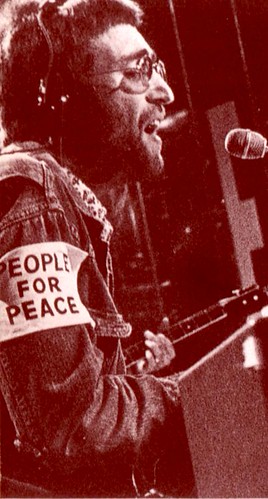 Mind Games
Mind Games
John Lennon
We're playing those mind games together
Pushing the barriers, planting seeds
Playing the mind guerrilla
Chanting the mantra, peace on earth
We all been playing those mind games forever
Some kinda druid dudes lifting the veil
Doing the mind guerrilla
Some call it magic, the search for the grail
Love is the answer and you know that for sure
Love is a flower, you got to let it, you got to let it grow
So keep on playing those mind games together
Faith in the future, outta the now
You just can't beat on those mind guerrillas
Absolute elsewhere in the stones of your mind
Yeah we're playing those mind games forever
Projecting our images in space and in time
Yes is the answer and you know that for sure
Yes is surrender, you got to let it, you got to let it go
So keep on playing those mind games together
Doing the ritual dance in the sun
Millions of mind guerrillas
Putting their soul power to the karmic wheel
Keep on playing those mind games forever
Raising the spirit of peace and love
7.05.2006
Superman Returns, for good
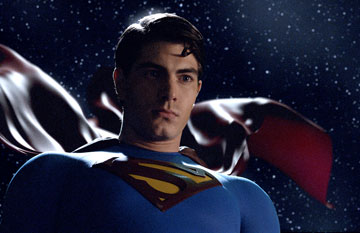 Superman Returns is more than a film; it is a work of renovation. There is perhaps no pop culture icon as familiar, as pervasive, as universal as Superman. He is a Christ figure, a Golem, an Übermensch who has been alternately fighting for "truth, justice, and the American way" since 1938, when Franklin Roosevelt was starting only his second term. While this film, and this Superman, is unlikely to make anyone forget his earlier incarnations, Bryan Singer does manage to renovate the filmic career of one of America's most enduring, and longest suffering, icons.
Superman Returns is more than a film; it is a work of renovation. There is perhaps no pop culture icon as familiar, as pervasive, as universal as Superman. He is a Christ figure, a Golem, an Übermensch who has been alternately fighting for "truth, justice, and the American way" since 1938, when Franklin Roosevelt was starting only his second term. While this film, and this Superman, is unlikely to make anyone forget his earlier incarnations, Bryan Singer does manage to renovate the filmic career of one of America's most enduring, and longest suffering, icons.
Mr. Singer left the thriving franchise he helped create in X-Men and X-2: X-Men United to help revive one of comicdom's more moribund properties. The risks were many, but the possible reward, in both the artistic and monetary sense, was great. How do you resurrect a film franchise whose last entry, nearly twenty years old, reviled and forgotten, was described by its star as "simply a catastrophe from start to finish"? Mr. Singer's answer was to take the whole thing back where it started. Singer essentially hits the Reset button, pretends the third and fourth film never happened, and loosely picks up where Superman II left off.
Singer's reliance on elements from the first two Superman films is so heavy, it lumbers past "homage" and borders on "remake." John Williams' score? Check. Whooshing title sequence? Bingo. Marlon Brando? Correctamundo. It goes even further. When Superman saves a plane from crashing, he tells the passengers the same line Christopher Reeve said to Margot Kidder in the first film, that flying is still the safest way to travel, statistically speaking. When Lex Luthor asks his moll to repeat what his father once told him, she replies, "Get out." When Superman crash-lands in the field behind the Kent farm, his spaceship is the same kind of pointy-star spaceship that he arrived in as a baby, only bigger. When Superman glides past the screen high above the Earth at the end of the picture, Brandon Routh seems to just barely restrain himself from flashing the audience the kind of knowing grin Christopher Reeve once did at the end of his Superman films. All that's missing, strangely, is the "S" on the back of his cape.
The effect of all this is to make Superman Returns a work of cinematic restoration. The Superman film franchise is like a house: it's got some fine craftsmanship, nice woodwork and trim, spacious rooms, a big yard. But the previous tenants painted all the woodwork sparkly gold, put up drop ceilings and track lighting in all the rooms, and installed a tiki bar in the backyard. The Superman franchise has character galore, but it's a fixer-upper.
Previous efforts at revitalizing the franchise have been memorably disasterous. Tim Burton and Nicholas Cage were once slated to pick it up. I remember hearing that they wanted Superman's suit to be all-white, and that he would fly as though he were standing upright. And they were going to kill Superman. Gee boys, aren't you clever? They got about twenty million for their troubles. I remember seeing Kevin Smith on a late-nite show talking about penning a Superman script, and saying that the producers wanted him to throw in elements that would sell Superman toys, so he went and wrote a scene where Superman wrestles some polar bears outside the Fortress of Solitude. Somewhere along the way there came the idea to film "Batman vs. Superman," but the Batman franchise was faring just as poorly, thanks to one Joel Schumacher and his leather fetish. The producers then went and tried to find some of the worst directors they could find to helm the revival: first Brett Ratner, and then McG. Ratner was fired after sinking another twenty million into development, and then ironically, was tabbed to direct X3 after Mr. Singer left to direct Superman Returns. McG, best known for unleashing Charlie's Angels parts one and two on the unwitting public, was all set to start filming, and then backed out because he was afraid of flying, and didn't want to fly to Australia. When the inevitable chatter comes along pointing to Superman Returns as a disappointment ticket-wise, it's important to remember that about sixty million dollars went into a bunch of guys doin' nothin'. One should also factor in the fact that, for expediency's sake, a lot of the preproduction work done by Messers. Ratner and McG was handed to Mr. Singer, which makes his resume as a renovator even more sterling when one studies the results.
Though there's no clear figure as to just how much Superman Returns really cost to make, suffice it to say that the balance is reflected nicely on screen. Superman has never flied as fast as he does in this film. Every setpiece is, in fanboy terms, awesome. If you once believed a man can fly, you'll also believe he can bench-press a small continent.
Singer's decision to recycle so many elements of the first two Superman films is a move that could have been seen as cannibalism. Yet it needed to be done, both to remind us just how awesome it once was to see Superman flying across the big screen, and to help us forget how awful his latter incarnations were.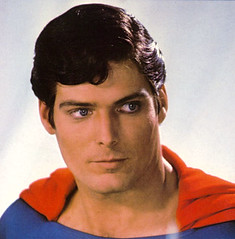 It features scene-stealing turns from Kevin Spacey and Parker Posey. Kate Bosworth is no Margot Kidder, for what that's worth, but she doesn't embarass herself. Similarly, Brandon Routh seems unable to make us forget Christopher Reeve. I believe that speaks less about the merits or faults of Routh's performance, and more about how great Reeve was as the Man of Steel. Though it haunted him throughout his career, Reeve wore the red cape better than any Superman before or since, and to his eternal credit, played the comedic everyman Clark Kent to clumsy perfection.
It features scene-stealing turns from Kevin Spacey and Parker Posey. Kate Bosworth is no Margot Kidder, for what that's worth, but she doesn't embarass herself. Similarly, Brandon Routh seems unable to make us forget Christopher Reeve. I believe that speaks less about the merits or faults of Routh's performance, and more about how great Reeve was as the Man of Steel. Though it haunted him throughout his career, Reeve wore the red cape better than any Superman before or since, and to his eternal credit, played the comedic everyman Clark Kent to clumsy perfection.
Maybe it's because he was the Superman I grew up with, but I just can't think of Superman without thinking of Christopher Reeve. His injury and death were the definition of tragedy, but it is clear that the tarnishing of the Superman image, though no fault of his own, was a tragedy as well for the actor. His ghost hangs over this film, and likely will in all subsequent ones.
On that note, I sincerely hope that there will be another return of Superman. Sure, it could have stood some more stringent editing. Sure, Bosworth's Lane is rather two-dimensional, and Routh's Kent has little more to do than stand around moping and waiting to bust out of his three-piece suit. Again, one should remember the baggage Singer had to carry going in that he inherited from previous, ahem, directors such as one McG. Consider also that X-Men suffered from the same sort of tentative awkwardness that occasionally muddies this film, but never fatally so. Then realize that Singer's X-2 was an unbound triumph, and his work conceiving X-3 was so strong, even Brett Ratner could hardly ruin it. Superman Returns is just less than a great film, but Superman is a great hero who deserved much better than he has gotten in the last few decades, and this film goes a long way towards reversing that injustice. With any luck, Singer will return to prove that Superman, once and for all, is here to stay.
6.21.2006
A big obsession with Harry Nilsson keeps me up at night
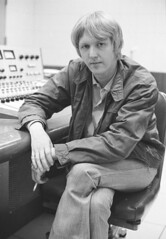 I just can't get interested in something--I have to get obsessed about it. That happened in a big way recently with Harry Nilsson. I knew little more about him than most other people did. I knew that he sang the song "Without You," which was a huge hit in the seventies. I knew that he had an album called Nilsson Schmilsson. I knew he was friends with John Lennon, that the two were drinking buddies during Lennon's "lost weekend," and that the two were once thrown out of a L.A. nightclub.
I just can't get interested in something--I have to get obsessed about it. That happened in a big way recently with Harry Nilsson. I knew little more about him than most other people did. I knew that he sang the song "Without You," which was a huge hit in the seventies. I knew that he had an album called Nilsson Schmilsson. I knew he was friends with John Lennon, that the two were drinking buddies during Lennon's "lost weekend," and that the two were once thrown out of a L.A. nightclub.
I keep a sort of mental checklist of artists that I want to look for whenever I go shopping for used vinyl. My memory is never the sturdiest of contraptions, so often times I remember not remembering a record I wanted to look for long after I have left the record store, vinyl in hand. Nilsson spent a long time on that list. My vague interest was renewed after getting obsessed with Chicago-based indie pop auteur Plush. I had listened to his album Underfed, then read about how that album consisted of demos for an album called Fed, which was recorded at an apparently extravagant expense and summarily released only in Japan. I snapped up his debut record, More You Becomes You, and then read Forced Exposure's review of it, which compared it to Nilsson Sings Newman. Curious, I started to read up on Nilsson, and my obsession started to grow.
I decided to start with the record I seen most often, Nilsson Schmilsson, and placed it firmly at the top of my mental list. But whenever I went vinyl shopping, I never saw it, or any Nilsson for that matter. There are some records that you just seem to stumble upon wherever you find used vinyl (Carole King's Tapestry springs to mind), but some that are harder to get.
I finally found it in Texas. We were visiting family in Austin, and doing a bit of shopping. We happened upon a record store whose front door was in an alley; there were signs leading to it all around the corner. When you entered, there was a huge room of vinyl. We didn't have a lot of time, yet I made the mistake of trying to be meticulous, searching record by record for interesting stuff. As Heidi started to get antsy, I fell back on my mental list, and Nilsson Schmilsson sprang immediately to mind. No luck in the Ns. I resorted to madly tearing through a bunch of records that were stacked in a sloppy, groove-crushing pile, just looking for something good to take away with me. And wouldn't you know, somewhere in that pile, I found Nilsson Schmilsson.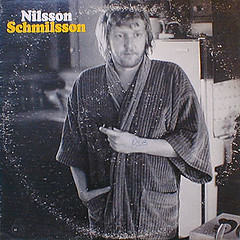 It would be appropriate for most people's purposes to say that Nilsson Schmilsson is the kind of starting-point record to recommend to curious listeners. It was his biggest seller, and contained his biggest single hit, "Without You," as well as "Coconut," which was recently resurrected for a Diet Coke commercial and was part of the Resevoir Dogs soundtrack, and "Jump Into the Fire," memorably used as the background music for Henry Hill's cocaine-fed meltdown in Martin Scorsese's GoodFellas. Yet this record defies what one would conventionally think of as a mainstream, accessible record. The title is zen-like and self-deprecating. The cover, shot by Dean Torrence of Jan and Dean, is comfortingly domestic but defiantly odd--Harry in his kitchen, wearing a bathrobe, looking like he needs a shower, smoking a hash pipe. The songs alternate from jaunty, Beatle-esque anthems ("Gotta Get Up," "Driving Along") to skeletal mind-teasers ("The Moonbeam Song," "Coconut," "I'll Never Leave You") to off-kilter barroom stomps ("Down," "Let the Good Times Roll"). The modus operandi on the whole is one of minimalism. Even the operatic "Without You" is built around a skeletal rhythm section, with Harry's vocal turn going from delicate to bombastic with balletic grace.
It would be appropriate for most people's purposes to say that Nilsson Schmilsson is the kind of starting-point record to recommend to curious listeners. It was his biggest seller, and contained his biggest single hit, "Without You," as well as "Coconut," which was recently resurrected for a Diet Coke commercial and was part of the Resevoir Dogs soundtrack, and "Jump Into the Fire," memorably used as the background music for Henry Hill's cocaine-fed meltdown in Martin Scorsese's GoodFellas. Yet this record defies what one would conventionally think of as a mainstream, accessible record. The title is zen-like and self-deprecating. The cover, shot by Dean Torrence of Jan and Dean, is comfortingly domestic but defiantly odd--Harry in his kitchen, wearing a bathrobe, looking like he needs a shower, smoking a hash pipe. The songs alternate from jaunty, Beatle-esque anthems ("Gotta Get Up," "Driving Along") to skeletal mind-teasers ("The Moonbeam Song," "Coconut," "I'll Never Leave You") to off-kilter barroom stomps ("Down," "Let the Good Times Roll"). The modus operandi on the whole is one of minimalism. Even the operatic "Without You" is built around a skeletal rhythm section, with Harry's vocal turn going from delicate to bombastic with balletic grace.
My Nilsson initiation set in motion, I proceeded to listen to Nilsson Schmilsson non-stop, and when I wasn't listening to it, I was thinking about it. Everything about Harry Nilsson, from his music to the man himself, seems manufactured to inspire either befuddled ennui or outright obsession.
Harry Nilsson spent a major part of the sixties trying to sell songs tin-pan-alley style in music business offices during his daytime hours, and spent his nighttime hours working as a bank clerk.
"Got a job at the bank. I took some tests, and I came out very high in the computer area. They were just starting computers. They said, 'Do you have any interest in computers?' I said, 'This is a dream come true. You bet!'Eventually his songs began to sell, and four of them were recorded by Phil Spector; two with the Ronettes, and one a duet between Nilsson and Cher. Soon he had what he called a “magical day” and experienced a creative breakthrough, writing three songs in one night: “Without Her,” “1941,” and “Don’t Leave Me.” Nilsson later recalled the creative surge, saying “…I realized then that I would never write another bad song.”2 “Without Her” was soon recorded by Glen Campbell, and has since been recorded by 13 different artists, including Blood, Sweat and Tears, George Benson, Herb Alpert and the Tijuana Brass, and Telly Savalas.
"So I got the job, kept the job. They found out I didn't graduate from high school and they called me in to fire me. I said, 'Look, I've done a good job. You know I have. I haven't been late,' and all that stuff. I cried tears and I said, 'Look, I had to do it, otherwise I wouldn't be able to get a job.'
"They really liked me, so they went out on a limb. They said, 'Okay, you're on probation for six months.' So I said, 'All right,' and I worked really hard for the six months, and they just kept me on and eventually I was in charge of the place when I left."1
Nilsson’s biggest breakthrough came rather unexpectedly.
The singer with the looks of a Swedish businessman…burst on to the scene at an Apple press conference in 1968. When asked who their favourite American artist was, the Beatles replied in unison "Nilsson!" And their favourite American group? "NILSSON!"One of the enduring traits of Nilsson’s career is that he was a songwriter’s songwriter—he wrote a number of songs that became hits for other groups (“One” for Three Dog Night, “Cuddly Toy” for the Monkees) while the biggest hits Nilsson recorded were written by other songwriters. “Everybody’s Talkin’”, written by Fred Neil, was the theme of the multiple-Oscar winning film Midnight Cowboy, a pop-culture landmark that helped make Nilsson a superstar and a Grammy winner for Best Contemporary Male Vocal Performance in 1969. Nilsson continued to feature other songwriter’s work throughout his recording career, eventually scoring another Grammy and another monster hit with Badfinger’s “Without You.” One of the cornerstones of his catalog is the 1970 album Nilsson Sings Newman, which featured songs by then-unknown L.A. songwriter Randy Newman, who accompanied Nilsson on piano. "He could do so many things as a vocalist that I couldn't do (like hold a note),"4 Newman said later.
They were enamoured of his debut album Pandemonium Shadow Show, a mix of vaudeville, classy orchestrated pop and the odd Beatles cover, delivered with Harry's sweet three-octave treatment.
The press were caught on the hop and hurriedly tried to get some info on this mysterious figure—they freaked when they discovered Nilsson had never even played live.
He told callers: "My amateur status is still intact, thank you."
The following Monday morning he received a phone call at 7am: "Is this Harry? This is John."
"John who?"
"John Lennon."
"Huh?"
"Your record is fucking fantastic, man. I just wanted to say you're great."
The next Monday at 7am Paul McCartney called him to rave in similar fashion about the album. Nilsson later recalled: "I got up the following Monday and waited for Ringo to call. He didn't."3
Nilsson’s early-seventies emergence as a recording superstar also saw him gain his reputation as a superstar party-animal. Two of his more notorious buddies were Keith Moon and John Lennon.
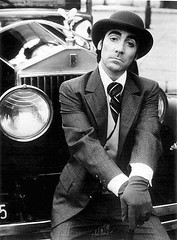 Nilsson met wild-man Who drummer Moon on the set of the film Son of Dracula.
Nilsson met wild-man Who drummer Moon on the set of the film Son of Dracula.We were supposed to be on the set at six, but it was nine before everybody was there. Then somebody brought out a bottle of brandy. Me, I think. Ah-Ha-Ha-HAHAHA! And Peter Frampton said no, no, too early, and some of the others said no. But 'Arry was standing there with an 'alf-pint mug. I knew at that moment it was destiny put us together. AhHhh-HAHAHAHAHA HAHAHA!
So we were drinking brandy at nine and, thanks to Mal Evans, white wine all the rest of the day. Then about six o'clock somebody came 'round and slipped little envelopes into our 'ands. It was a pay packet! I 'adn't 'ad a pay packet in ten years. And 'Arry'd never 'ad one. We were pretty well out of it, and we looked at each other and then tore up one-hundred and seventy pounds in one-pound notes, threw it up in the air and danced about, cackling like schoolboys. AHHHH-HAAAA-HAHAHA-AA-HAAAAHAAA-haaa! Dancing and leaping about, clutching bottles of Blue Nun liebfraumilch in our hands, singing, "We're millionaires, aren't we?"5
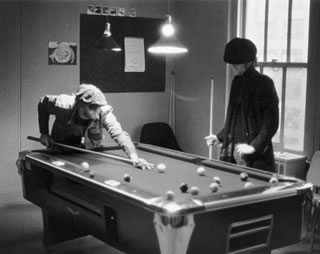 Nilsson’s connection with the Beatles retains a strong hold to this day; when discussing Nilsson, fans often reflect upon the Beatles era in general, and Nilsson’s friendship with Lennon in particular. Lennon played a major part in Nilsson’s monetary success, helping secure a 5 million dollar contract for Nilsson after the success of the “Schmilsson Cycle”: Nilsson Schmilsson, Son of Schmilsson, and A Little Touch of Schmilsson in the Night. Five million dollars was a then-unheard of amount for a recording artist.
Nilsson’s connection with the Beatles retains a strong hold to this day; when discussing Nilsson, fans often reflect upon the Beatles era in general, and Nilsson’s friendship with Lennon in particular. Lennon played a major part in Nilsson’s monetary success, helping secure a 5 million dollar contract for Nilsson after the success of the “Schmilsson Cycle”: Nilsson Schmilsson, Son of Schmilsson, and A Little Touch of Schmilsson in the Night. Five million dollars was a then-unheard of amount for a recording artist.“I had signed an agreement with RCA for a new, $5 million contract and they had reneged on it; the new president didn't sign it. I had been saying, "The contract's binding. We'll take you to fucking court, man.' And the president had said, 'It's not binding here….'
"I said to John, 'I just got $5 million, and they took it away from me, like that.' He said, 'Ah, they're all fuckers, Harry. They're all fuckers." He said, "Just go down and tell the guy he's a fucker.'
"So I went down to RCA. We'd been up all night long and it was now 10 in the morning. Both still drunk, with shades, hats, dark jackets. The secretary said, 'Mr. Glancy, uh, Harry Nilsson and John Lennon are here to see you, sir.'
"'What?' Boom! Door opens immediately. We walk in. There we are, you know? In every office, heads are turning to look at us. He said to John, 'Hi! How are you doing, sir? Would you like a cigar?' John said, 'No, thanks. I'd take a brandy.' So we had a brandy, and John said, 'Look, it's about Harry. You know, you've only ever had two artists on your label: Elvis and Harry. He told me what you're paying him. Look, for that money, I'll sign it. You've got an artist! Pay the two dollars!' 'Pay the two dollars' was like saying, 'pay the parking ticket, rather than fight City Hall….'
So he said, 'Well, we'll have to get the contracts together.' I said, 'No, no. They're on the 10th floor. They're in Legal. Ask Dick Etlinger, in Business Affairs. He's the guy.' So he calls up and says, 'Do you have the Nilsson contract? Could you bring it up here?' Because he didn't want to look like an asshole in front of John.
"They brought up the contract. I said, 'All you have to do is affix your signature where it says "President." Just write your name on it.' He said, 'Okay,' and he did it, right in front of John. John made me $5 million that minute. I looked at John for a minute and I almost cried. Then I said, 'I'd like four copies.' I gave one to John, one to me, one in the hotel safe, and I sent one out to California. And that's how I got to be a multimillionaire. Thank you very much, John!"6
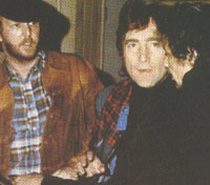 The most infamous and, sadly, enduring event of that period happened with Lennon at a performance by the Smothers Brothers at L.A.’s Troubadour nightclub. Albert Goldman recounted the events in his controversial book The Lives of John Lennon. At the time, Lennon was involved with an affair with his and Yoko Ono’s secretary, May Pang.
The most infamous and, sadly, enduring event of that period happened with Lennon at a performance by the Smothers Brothers at L.A.’s Troubadour nightclub. Albert Goldman recounted the events in his controversial book The Lives of John Lennon. At the time, Lennon was involved with an affair with his and Yoko Ono’s secretary, May Pang.About three weeks before the show, Yoko had called and told John that on her birthday she had slept with David Spinozza. (Spinozza, a well-known New York studio musician, later denied it.)The incident at the Troubadour marked a turning point in Nilsson’s life and career. Nilsson later lamented "that incident ruined my reputation for 10 years. Get one Beatle drunk and look what happens….It still haunts me. People think I'm an asshole and a mean guy. They still think I'm a rowdy bum from the '70s who happened to get drunk with John Lennon, that's all….I just introduced John and Ringo to Brandy Alexanders, that was my problem.”8 At a certain level the incident reminds one of the apocryphal story of Bob Dylan turning the Beatles on to marijuana circa-Rubber Soul, but on the other hand the fallout has a parallel with the still-potent ire directed at Yoko and Linda McCartney after the breakup of the Beatles. Apparently, Beatle fans are more willing to blame John and Paul’s wives for the breakup of their favorite band than they are willing to blame John and Paul themselves; similarly, they are quick to blame Harry Nilsson for John Lennon’s “Lost Weekend” dissolution, though it is hard to believe that Lennon had never discovered alcohol before he met Nilsson.
John appeared to be unaffected by the news. But Yoko's words set a time bomb ticking in John's madly jealous mind.
When he arrived at the Troubadour with May and Harry 'round about midnight on March 13, well before the second show, he was already half loaded and seething with anger. Ushered into the VIP section, where they found a celebrity clique, including Peter Lawford, Pam Grier, Jack Haley Jr. and Alan Sacks, producer of Welcome Back, Kotter,' the threesome booked their orders for triple milk shakes brandy Alexanders.
When the drinks arrived, John downed his in a single gulp. ''Let's have another round,'' he proposed expansively. Then he began to hum ''I Can't Stand the Rain,'' an ominous sign. Harry joined his voice with John's and soon both singers were performing happily, while accompanying themselves by banging spoons and knives against the glasses and saltcellars.
Having stolen the spotlight with their exhibitionistic behavior, Lennon and Nilsson were surrounded instantly by photographers. John Lennon had an instinctive talent for camera miming. When the spirit was upon him, he could shoot a look, a pose, a gesture into the lens that said it all.
Now he decided to send Yoko a little message, acknowledging the news of her birthday present. Grabbing May Pang by the throat, he pulled her toward him and planted a brutal kiss on her lips. As the flash cubes exploded, the photographers shouted, ''Who is she?''
John smiled at May and crowed, ''The secret is out!''
The Smothers Brothers were an object of liberal sympathy in Hollywood because of the way they had been booted off TV. This night was supposed to mark the beginning of their great comeback. The moment they stepped onstage, they received an ovation. But when the cheering and applause subsided, John and Harry could still be heard singing - louder than ever and without any sign of stopping.
Soon Lennon was alternating between loud singing and shouted obscenities. Occasionally, he'd vaunt: ''I'm John Lennon!'' Soon people all over the packed club were shouting back at John.
Finally, Ken Fritz, a mild little guy who managed the Smothers Brothers, came over to the table. He was hopping mad. ''Look,'' he shouted, ''we've worked hard for this, and I'm not going to let you fuck it up!'' With that, he grabbed John's shoulder.
John reared up instantly, overturning the table with a crash of shattering glass. Spinning around, he caught Fritz with a hook to the chin. Fritz swung at Lennon, as the crowd roared. Before either could throw another punch, Peter Lawford came charging in with a group of bartenders and waiters. Forming a flying wedge, they gave John and Harry the bum's rush. The hecklers were hustled through a furious crowd, whose members threw punch after punch at John Lennon.
In June 1974, John and Harry finished their whiskey-voiced album Pussy Cats. May Pang returned to Lennon's side in New York and Harry Nilsson left it forever.7
In a cruel twist of circumstance, Nilsson's deteriorating reputation and rock 'n roll history intertwined two more times; Mama 'Cass' Elliott of the Mamas and Papas and Keith Moon both died in Nilsson's London apartment, which he often loaned to friends while he was home in California, Elliott on July 27, 1974, and Moon on September 7, 1978.9
The cruelest twist in the Nilsson saga happened right before the sessions with Lennon for Pussy Cats. Nilsson ruptured a vocal cord, but as legend has it, hid the fact from Lennon out of fear he would end the sessions. Again, it is hard to believe that no one noticed the difference. The proof is in the mix--Nilsson's voice is ragged throughout the record, and hearing him try to reach the upper octaves he once scaled so effortlessly is nearly as painful to hear as it must have been to sing.
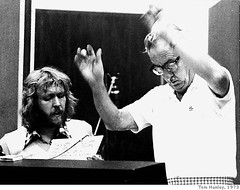 The common consensus is that Nilsson's non-stop partying lifestyle caused his vocal cord to rupture, but one could also blame the shift to the rock n' roll vocal style he adopted for Nilsson Schmilsson and exacerbated on Son of Schmilsson. He used to aim for subtlety, deftly creating a chorus with his multitracked three-octave voice, as best demonstrated on Nilsson Sings Newman, but in the Schmilsson cycle, for the first time in his career, he more often than not settled into a mid-range baritone yelp of the kind his buddy Lennon made famous on "Twist and Shout." While Son of Schmilsson's loopy contact-high makes it a quintessential "party record," it gains an unexpected and unintentionally melancholy pallor when one realizes the toll it must have taken on Nilsson's beautiful, signature voice, so triumphantly utilized on "Without You." Because of this, Nilsson's breezy-yet-sincere pop standards record A Little Touch of Schmilsson in the Night, perceived at the time as yet another bizzare indulgence, gains great significance, for it is the last time Nilsson's classic singing voice would be put to tape.
The common consensus is that Nilsson's non-stop partying lifestyle caused his vocal cord to rupture, but one could also blame the shift to the rock n' roll vocal style he adopted for Nilsson Schmilsson and exacerbated on Son of Schmilsson. He used to aim for subtlety, deftly creating a chorus with his multitracked three-octave voice, as best demonstrated on Nilsson Sings Newman, but in the Schmilsson cycle, for the first time in his career, he more often than not settled into a mid-range baritone yelp of the kind his buddy Lennon made famous on "Twist and Shout." While Son of Schmilsson's loopy contact-high makes it a quintessential "party record," it gains an unexpected and unintentionally melancholy pallor when one realizes the toll it must have taken on Nilsson's beautiful, signature voice, so triumphantly utilized on "Without You." Because of this, Nilsson's breezy-yet-sincere pop standards record A Little Touch of Schmilsson in the Night, perceived at the time as yet another bizzare indulgence, gains great significance, for it is the last time Nilsson's classic singing voice would be put to tape.The Nilsson catalog takes a hard right turn into obscurity after Pussy Cats, perhaps best personified by ...That's the Way it Is, which rock critic Stephen Thomas Erlewine memorably encapsulated by asking "for chrissakes, who wants this album?" The last "proper" Nilsson album, and his last for RCA, was 1977's Knnillssonn, which enjoyed a sincere marketing push from the record label until Elvis died, causing them to abandon Nilsson's record and put a full-court press effort into milking the King's back catalog.10
Nilsson was effectively retired from music for the rest of his life. His last widely-accessible musical effort came when he wrote the songs for the feature film adaptation of Popeye, with arrangements by Van Dyke Parks. Robert Altman said, "Nobody wanted him at first except Robin Williams. Everyone said 'You'll get in trouble with him -- he'll get drunk; he won't do it; he's all washed up.' As a matter of fact I said all of those things about Harry to Robin myself one day. Then I went home and thought about it and said to myself, 'Jesus, that's what some people are saying about me!' So I called Harry Nilsson, because I had never met him in my life, and we got along terrifically."11
 The rest of his time was spent trying to operate an independent production company he founded with counterculture icon Terry Southern called Hawkeye Entertainment. Their most notable output was the Whoopi Goldberg film The Telephone, which the two of them wrote. The movie was widely panned, which probably had no little part to do with Goldberg and her cinematographer husband suing the film's distributors to prevent them from releasing it, due to creative differences with the director, Rip Torn, who had never directed before, and has not since. Nilsson had to assume the reins of CEO of Hawkeye when the qualified man who had held the job was released. An L.A. Times story on Hawkeye's troubles took special care to describe Nilsson's deteriorating state:
The rest of his time was spent trying to operate an independent production company he founded with counterculture icon Terry Southern called Hawkeye Entertainment. Their most notable output was the Whoopi Goldberg film The Telephone, which the two of them wrote. The movie was widely panned, which probably had no little part to do with Goldberg and her cinematographer husband suing the film's distributors to prevent them from releasing it, due to creative differences with the director, Rip Torn, who had never directed before, and has not since. Nilsson had to assume the reins of CEO of Hawkeye when the qualified man who had held the job was released. An L.A. Times story on Hawkeye's troubles took special care to describe Nilsson's deteriorating state:His appearance has changed considerably from the way he looked on his album covers in the early 1970s, when he was a skinny young man with golden blond hair and beard. The hair and beard are graying, and his weight has ballooned to what he says is a lifetime high of 243 pounds.Out of the public eye, he spent the rest of his life as a husband and father with his wife, Una, and their six children, plus one grown son from an earlier relationship. This idyll was disturbed by three cruel strikes.
Always known as a heavy smoker and drinker, Nilsson does little to change that image. At a two-hour lunch last week, he nervously smoked half a pack of cigarettes and drank four vodka martinis, each with a twist of lemon.12
In 1991, he discovered that his manager, Cindy Sims, had been secretly embezzling his and other clients' money, going so far as to remove forclosure notices off of Nilsson's home to keep him unaware. In a letter filed in bankruptcy court, Nilsson wrote "We went to bed one night a financially secure family of eight and woke up the next morning with $300 in our checking account....I'm scared....I never believed this could happen. It was my greatest fear growing up and it's still my greatest fear."13
Nilsson would never see the outcome of his estate's travails in U.S. bankruptcy court. He suffered a heart attack on Valentine's Day, 1993. This spurred him into a flurry of activity, compiling a greatest hits collection for RCA, Personal Best, and beginning work on a new album with his new manager, David Spero. He even began work on an autobiography.
Sitting on a shelf above Spero's desk are several spiral-bound copies of a manuscript titled, "Harry's Book." The largest version contains pages and pages of color Xeroxes of old photos taken at Harry's Bel Air home: John Lennon stands in front of a pool table in combat boots and what appears to be a trench coat; he is without pants. Keith Moon mugs for the camera. Gene Wilder and Gilda Radner are captured in bed.Harry Nilsson died January 15, 1994, of a second heart attack. He was 52.
Spero says Nilsson spent a lot of time at Kinko's, making copies to put in his book or writing down random thoughts he remembered. There was one about the time "Harry and Keith Moon decided to stay sober (and failed hilariously)," another on "the real reason Harry and John Lennon were thrown out of the Troubadour when they went to see the Smothers Brothers."
"For two years, he'd call me every morning and told me stories. Sometimes they took three minutes, sometimes longer," Spero fondly recalls. Nilsson also sent cards and packages. When Spero's wife Ellen was seriously ill right after Nilsson got out of the hospital in '93, he sent a card saying, "What's left of my heart goes out to you."
Spero says Nilsson took quite seriously his doctor's warning that he might have only one to three years to live, but he would still eat three desserts if he felt like it, even with diabetes.
One day, Spero says he kiddingly asked Harry if he still had an old bathrobe he had almost worn out. "Harry said, `Of course, you never throw out old bathrobes.' A couple days later a Fed Ex box shows up with the bathrobe inside and photos of Harry in the yard in the robe,' says Spero, pulling out a color Xerox of Harry in his short blue bathrobe digging with a long-handled shovel. A handwritten caption across the bottom reads, "I Can Dig It."
The bathrobe now hangs next to the bathroom in Spero's office, an everyday reminder of Harry.14
Nearly all that remains of Nilsson is his extensive catalog, 18 albums strong, yet languishing for the most part in obscurity. He is the quintessential cult artist, known to few, yet obsessed over by his small, devoted fan base. In his heyday, he was as famous as his still-famous friends, but to this day his musical output is either marginalized in comparison to the songwriters he helped nurture and inspire, such as Randy Newman and Tom Waits. Those who give him any credit do so only on the merit of his two biggest singles, "Everybody's Talkin'" and "Without You." To this day he is most often remembered as the drinking buddy who got thrown out of a nightclub with John Lennon.
The sorry state of pop culture's memory of Harry Nilsson may be taking a turn for the better. Son of Schmilsson and A Little Touch of Schmilsson in the Night have been remastered and rereleased. A documentary film, Who is Harry Nilsson... (And Why is Everybody Talkin' About Him)? premiered at the Santa Barbara Film Festival to acclaim from Variety, the Hollywood Reporter, and Leonard Maltin, and recieved a standing ovation led by none other than Brian Wilson. Hopefully such efforts will renew people's interest in Nilsson.
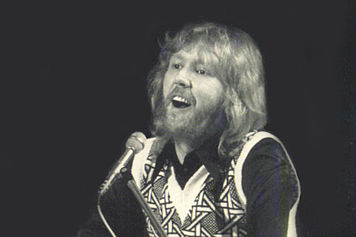 He was known as a singer's singer, a songwriter's songwriter, and the Beatles' favorite artist, and then he was forgotten. Ironically, the cornerstones of his artistic ouvre were a sincere nostalgia for the forgotten and marginalized elements of the American experience, and most poingnantly, an overwhelming fear of being left alone, abandoned and forgotten.
He was known as a singer's singer, a songwriter's songwriter, and the Beatles' favorite artist, and then he was forgotten. Ironically, the cornerstones of his artistic ouvre were a sincere nostalgia for the forgotten and marginalized elements of the American experience, and most poingnantly, an overwhelming fear of being left alone, abandoned and forgotten.Such is the cruelty of time, fate, and the fickle tastes of the fans of popular music. Harry Nilsson should never be forgotten. Lovers of popular music, to say nothing of the Rock and Roll Hall of Fame, should remember him and his music, always.
:::::
One thing I felt as I waded my way through the Nilsson discography was the need for a good compilation of his music. Personal Best seemed too large, and indeed, Nilsson intended it to be three CDs, not two. The newest greatest hits compliation Everybody's Talkin' is skimpy at 14 songs, and leans too heavily on Nilsson Schmilsson and Son of Schmilsson, ignoring almost all of his earlier catalog. Something had to be done.
This is what I came up with. My personal compilation of Harry Nilsson is called Me and My Arrow: A Little Mix of Schmilsson 1967-1977.
I tried my best to cover as much of his catalog as I could on a single disc, which was hard to do. I had to make a number of difficult omissions. There are no tracks from Son of Schmilsson, which I can hardly try to explain, other than to say "I tried." I tried so many times to fit the caustic "You're Breakin' My Heart" ("you're tearing it apart/so fuck you!"), but in the end decided it to leave it off, thinking that my mother would listen to it with my young niece in the car. (My mother made such considerations moot when she admitted being perplexed at receiving the CD, saying she was going to give it to my brother, who is also the father of my niece.) I also have no entries from Nilsson's catalog spanning between Pussy Cats and Knnillssonn, simply because I don't own any of those records. I would have liked to fit a song on there from Popeye, especially "He Needs Me," used to great effect in Punch Drunk Love, directed by L.A. auteur and avowed Nilsson fan Paul Thomas Anderson, but couldn't find it available for legal download anywhere before burning time.
So this is it, what I intended to be a definitive overview of the great Harry Nilsson songbook, knowing that such an endeavor is impossible. I'll get anyone a copy who wants one, and everyone else, and you know who you are, can construct their own. Those who are hooked are directed to pick up either Nilsson Schmilsson or Nilsson Sings Newman post haste, and after that, it's every Schmilssonian for his or herself.
1. Gotta Get Up (Nilsson Schmilsson, 1971). The first track of his iconic album is the first track of my mix, for reasons of sheer economy. A rousing, Beatle-esque number, which provides a funny counterpoint to the cover's image of a proudly lazy-looking Nilsson.
2. Vine St. (Nilsson Sings Newman, 1970). American pop music in a bottle; from a cod-boogie workout to a wistful rememberance of things past in a few minutes.
That's the takeThis song was nearly the first track of this compilation.
That we made,
But I'm sad to say we never made the grade.
That was me,
Third guitar,
I wonder where the others are.
3. 1941 (Pandemonium Shadow Show, 1967). An abstract work of autobiography, done up in baroque trappings. Surely something that "turned on" the Beatles, and struck an early chord of brotherhood in another abandoned son, John Lennon.
4. Daddy's Song (Aerial Ballet, 1968). Completes a doubleheader of missing-dad songs. Originally appeared on the Monkee's Head. Nilsson later recounted meeting the Monkees:
"So I sang seven, eight or nine songs, and Michael Nesmith said, 'Man, where the fuck did you come from? You just sat down there and blew our minds like that. We've been looking for songs, and you just sat down and played an album for us. Shit! Goddammit!' He threw something on the floor. And he went and got Mickey Dolenz and he said to him, 'Would you listen to this man? Listen to that!' Micky gave a surprised laugh, and Davy Jones started laughing over one song, and it was like the three of them were just out of their tree. Only Peter Tork couldn't give a shit."15This story is even funnier considering Nilsson once tried out to become a Monkee.
5. I Guess the Lord Must Be in New York City (Harry, 1969). The stylistic twin of "Everybody's Talkin'", this track was apparently offered first to the makers of Midnight Cowboy. One wonders if, had it been accepted, Harry would have won an Oscar rather than a Grammy.
6. One (Aerial Ballet, 1968). Nilsson the songwriter's most recognizable tune, in the skeletal form later lovingly recreated by Aimee Mann and Jon Brion.
7. Driving Along (Nilsson Schmilsson, 1971). The liner notes of this record's reissue report that Nilsson wished he hadn't included this song. I'm glad he did; it's one of my favorites.
8. Mournin' Glory Story (Harry, 1969). The most bizarre thing about this record may be how defiantly baroque and vaudville it is, being that it was released in the midst of the sixties' most turbulent and psychedelic year. This song has been on and off of this compilation more times than I can count.
9. Love Story (Nilsson Sings Newman, 1970). One of the most delicate vocal performances on a delicate album. This captures the mood of the record well; it wastes no time getting started, and lingers no longer than a millisecond at the end. In the middle of it all is a simple yet rousing chorus throwing the surrounding economy into stark relief:
You and me, you and me, you and me, baby,10. Early in the Morning (Nilsson Schmilsson, 1971). One of that record's quiet moments; makes me think I'm in Harry's living room some early morning in L.A.
You and me, you and me, you and me, baby,
You and me, you and me, you and me, baby,
You and me, you and me, you and me, baby
11. Me and My Arrow (The Point! 1970). Anthem from the animated program, written by Harry, about a boy and his dog. It sounds strangely funky, says a whole lot with very little, and barely lasts two minutes.
12. Jump into the Fire (Nilsson Schmilsson, 1971). The rockingest song from Harry's "rock album." His wail is unforgettable.
13. Everybody's Talkin' (Aerial Ballet, 1968). Strange thing is, it's hard to believe that this is Nilsson. For a guy that could do just about anything with his voice, this sounds the most different of anything he ever sang.
14. Without Her (Aerial Pandemonium Ballet, 1971). Harry cashes in and welds together his first two records, rerecording many of the vocals. But it's too late, he's already helped invent chamber pop. Nilsson made a career out of singing sad songs, and this is one of his most teasingly downbeat.
15. The Moonbeam Song (Nilsson Schmilsson, 1971). It is what it says it is, and it is one of the prettiest songs Nilsson ever put to wax.
16. All I Think About is You (Knnillssonn, 1977). The opening salvo of Nilsson's final proper album. His trademark circular lyrics are in full effect, but it is given a haunting poignancy by his latter-era husky baritone. It will give you chills if you let it.
17. Coconut (Nilsson Schmilsson, 1971). Shit is crazy.
18. The Beehive State (Nilsson Sings Newman, 1970). This record won Stereo Review's album of the year award, and it might be because of this song. What sounds like Nilsson's voice being run through a wah-wah pedal is actually Nilsson opening and closing the cups of his headphones in front of the microphone to the beat.
19. Cuddly Toy (Pandemonium Shadow Show, 1967). Another track made famous by the Monkees; Harry flashes his naughty, miscreant streak early on in his career. What do you think this means?
You're not only cuddly toy that was ever enjoyed by any boyMind you that the Monkees sang this.
You're not the only choo-choo train that was left out in the rain
The day after santa came
You're not the only cherry delight that was left out in the night
And gave up without a fight, ohhhh,
You're not the only cuddly toy that was ever enjoyed, ha, by any boy
You're not the kind of girl to tell your mother
The kind of company you keep
I never told you not to love no other
You must of dreamed it in your sleep, zop, zop,
20. Without You (Nilsson Schmilsson, 1971). Here it is, the song to end all songs, the tribute to codependence, the world's first power ballad. The key thing is to listen. Listen to this. This song is incredible. It sounds so delicate, just two piano chords, played almost half-disinterestedly, and then in comes Nilsson, crooning so softly you'd swear he was lying in bed next to you.
No I can't forget this evening....Then Jim Keltner tumbles in on the drums, slowly beating them as though he were lurching forward with all his might against gravity itself, and Klaus Voormann just follows him up the stairs on bass. Have I not mentioned Klaus Voormann yet? This guy was best friends with the Beatles in Hamburg, and very well could have been playing bass for them on the Ed Sullivan Show, but still ended up being on just about every ex-Beatle's first solo record, and here he is with Nilsson. You just can't take the Beatles out of Nilsson, nor Nilsson out of the Beatles.
Or your face as you were leaving
But I guess that's just the way the story goes
You always smile but in your eyes your sorrow shows,
Yes it shows.
No I can't forget tomorrow
When I think of all my sorrow
When I had you there but then I let you go
And now it's only fair that I should let you know
What you should know.....
Hearing Nilsson scale the heights of his dizzying vocal range never fails to thrill. This is, and always will remain, a song that only Harry Nilsson could sing. This fact makes the profound tragedy surrounding the song's writers, Pete Ham and Tommy Evans, only more tragic.
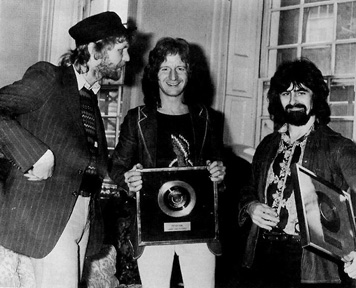 Nilsson heard this song at a party long before he recorded it, and thought it was a Beatles song, but later found out it was written by the Beatles' band of proteges, Badfinger. By the time Nilsson made it a smash hit, Badfinger had already been swindled out of the royalties to their songbook, and suffered due to the collapse of their label, the Beatles' Apple Records, and subsequent mistreatment by Warner Brothers records, which caused Wish You Were Here, which should have been a triumphant comeback, to wither unheard on record store shelves. When "Without You" was a hit, Ham was working menial labor in a factory just to make ends meet, his own song playing on the radio as he worked.16 Ham hung himself in 1975, and Evans did the same in 1983. Nilsson did a stand-up thing when "Without You" hit and presented both of them with silver records (right), but it ultimately did little to forestall the fates of these two doomed rockers.
Nilsson heard this song at a party long before he recorded it, and thought it was a Beatles song, but later found out it was written by the Beatles' band of proteges, Badfinger. By the time Nilsson made it a smash hit, Badfinger had already been swindled out of the royalties to their songbook, and suffered due to the collapse of their label, the Beatles' Apple Records, and subsequent mistreatment by Warner Brothers records, which caused Wish You Were Here, which should have been a triumphant comeback, to wither unheard on record store shelves. When "Without You" was a hit, Ham was working menial labor in a factory just to make ends meet, his own song playing on the radio as he worked.16 Ham hung himself in 1975, and Evans did the same in 1983. Nilsson did a stand-up thing when "Without You" hit and presented both of them with silver records (right), but it ultimately did little to forestall the fates of these two doomed rockers.21. Think About Your Troubles (The Point! 1970). Whew! Good time to just sit and think things over, like how a teardrop can fall into a teacup, then get thrown in the ocean, where somewhere a whale's body is decomposing, 'cause that's what happens to bodies at the bottom of the ocean....Ok, things are starting to gain perspective, until....
22. Don't Forget Me (Pussy Cats, 1974). By default, the most touching song on a gonzo album, made all the more heartbreaking by the broken voice that sings it. Marianne Faithfull, once famous for getting busted for drugs wearing only a throw rug in swinging London with her boyfriend Mick and his buddy Keef, revived the song as she tried to revive her own singing career in 1997. "'I wanted one of my own contemporaries on the record,' Faithfull says of the Nilsson selection. '(The song) had to be something that matched up to the other material. It needed wit, charm, and a real musicality as well . . . In the end, I couldn't find anything other than a Harry Nilsson song that would have fit.'"17 Depite her reverence for her late friend's work, she still found time to bizarrely slander the man and the circumstances of his death. "We used to do drugs together. When I say drugs, I don't mean those modern-day, airy-fairy drugs. I'm talking about narcotics. One day I had to stop because I was going to die. So I went off to this place in Minnesota--I highly recommend it."18 She also claimed that he died in a dentist's chair, and that while his body sat in the mortuary, it was swallowed by a fissure during an earthquake. "Harry's rather large body--I suppose it was all the drugs and alcohol--fell down a fissure and was lost forever. So they buried another coffin that they filled with stones."19
Dawn Eden, writer of the last and most definitive Harry Nilsson interview still available, One Last Touch of Schmilsson, refuted Faithfull's claims about Nilsson dying in a dentist's chair and disappearing through the Earth's crust. Yet a story told by Paul McCartney about a visit he made to Lennon and Nilsson during the Pussy Cats sessions attests to Faithfull's other claim:
"So I went out there and he was doing Pussy Cats with Nilsson and Keith Moon and Jesse Ed Davis, to name but three total nutters. Three beautiful total alcohol nutters plus John, forget it! Even the location is perfect. We went round to a session and sat there for a bit. It was a bit strange, John and I, seeing each other at that time. But then we dropped by their house the next day for a cup of tea or something.23. I'll Never Leave You Alone (Nilsson Schmilsson, 1971). Nilsson ends his touchstone album with a song that says "the album's over, but you'll never get rid of me." Indeed, this haunting coda makes such assurances true.
"I remember Harry Nilsson offering me some angel dust. I said, `What is it?' He said, `It's elephant tranquilliser.' I said, `Is it fun?' He thought for about half a minute. `No,' he said."20
24. Over the Rainbow (A Little Touch of Schmilsson in the Night, 1973). Ok, I could have cut this to make room for "You're Breakin' My Heart," but I'm a sucker for this song, and I'm trying hard to land this ship safely. Plus, hearing Harry recite his studio wish-list to the control room at the end is hilarious.
25. Living Without You (Nilsson Sings Newman, 1970). More supremely-wrought heartache from one of Nilsson's best efforts, this time providing a fitting end to a rememberance of a great man.
Ev'ry one's got something:::::
And they're out tryin' to get some more
They got something to get up for
Well I ain't about to.
Nothin's gonna happen
Nothin's gonna change
Baby, it's so hard
Living without you
It's so hard
Baby, it's so hard
Baby, it's so hard
Living without you
1. Eden, D. (1994). One last touch of Nilsson. Goldmine 20(9). Retrieved June 22, 2006, from http://www.harrynilsson.com/page-one-last-touch-of-nilsson-part-1.html
2. Eden.
3. Stanley, B. (2004, February 20). Hit & myth. The Times. Retrieved June 20, 2006, from Factiva database.
4. Wener, B. (2000, June 28). Something gained in translation: Harry Nilsson's lyricism, Randy Newman's lyrics a potent combination [Record review]. The Orange County Register, p. B08. Retrieved June 20, 2006, from Factiva database.
5. Hopkins, J. (1972, December 21). Keith Moon bites back [Electronic version]. Rolling Stone. Retrieved June 22, 2006, from Rolling Stone Web site: http://www.rollingstone.com/news/profile/story/9264343/keith_moon_bites_back
6. Eden.
7. Goldman, A. (1988, August 30). Yoko’s loss is Pang’s gain—briefly [Republished portion of the book The lives of John Lennon]. St. Louis Post Dispatch, p. 1D. Retrieved June 22, 2006, from Factiva database.
8. Eden.
9. Lewis, J. (2006, May 3). It happened here...No. 19 Curzon Place, Mayfair. Time Out London, p. 94. Retrieved June 22, 2006, from Factiva database.
10. Eden.
11. Altman, R. (n.d.). Popeye. Retrieved June 22, 2006 from http://www.harrynilsson.com/page-popeye.html
12. Bates, J. (1988, January 12). Nilsson's talkin': wealthy rock singer shifts attention to making movies; doubters wonder whether he can carry a business tune [Valley Edition]. Los Angeles Times (pre-1997 Fulltext), p. 9A. Retrieved June 20, 2006, from ABI Inform Global database.
13. Bates, J. (1994, November 7). In the end, only creditors talked to Nilsson. The Seattle Times, p. F5. Retrieved June 20, 2006, from Factiva database.
14. Barber, C. (1999, March 1). Memories of Harry: Songs by the late Harry Nilsson popped up in the movie "You've Got Mail" and rekindled interest in the singer-songwriter. The Cleveland Plain Dealer, p. 1E. Retrieved June 20, 2006, from Factiva database.
15. Eden.
16. Turner, R. (2004, December 18). Beatles guitar lands at auction after long and tragic journey. The Western Mail, p. 17. Retrieved June 20, 2006, from Factiva database.
17. Evans, M. (1997, March 21). Marianne Faithfull changes her tune. Portland Oregonian [Sunrise], p. 38. Retrieved June 20, 2006, from Factiva database.
18. Musto, M. (1997, February 11). La dolce Musto. The Village Voice, p. 10. Retrieved June 20, 2006, from Factiva database.
19. Pandora. (1999, June 16.) The Independent - London [Observational column], p. 4. Retrieved June 20, 2006, from Factiva database.
20. Miles, B. (1997, September 28). Yesterday, part 3: Without the Beatles, 'I didn't shave' [Republished portion of the book Paul McCartney: Many years from now]. The Observer. Retrieved June 23, 2006, from Factiva database.
:::::
My apologies to everyone I've bored in the wake of this obsession, and my sincere apologies to the people I've tried so hard not to plagiarize in making this. Please, everyone who reads this, read Dawn Eden's piece, buy Nilsson's records, subsrcibe to the L.A. Times, everything, do it. Maybe now I can just listen to some Nilsson sometime.
